
DIGGING FOR DAFFYNISHUNS
The Project Gutenberg EBook of The Silly Syclopedia, by Noah Lott This eBook is for the use of anyone anywhere at no cost and with almost no restrictions whatsoever. You may copy it, give it away or re-use it under the terms of the Project Gutenberg License included with this eBook or online at www.gutenberg.net Title: The Silly Syclopedia Author: Noah Lott Release Date: April 25, 2005 [EBook #15705] Language: English Character set encoding: ASCII *** START OF THIS PROJECT GUTENBERG EBOOK THE SILLY SYCLOPEDIA *** Produced by Michelle Croyle, David Garcia and the Online Distributed Proofreading Team



 A Terrible Thing in the Form of a Literary Torpedo which is Launched
for HILARIOUS PURPOSES ONLY Inaccurate in Every Particular Containing
Copious Etymological Derivations and Other Useless Things
A Terrible Thing in the Form of a Literary Torpedo which is Launched
for HILARIOUS PURPOSES ONLY Inaccurate in Every Particular Containing
Copious Etymological Derivations and Other Useless Things
(An Ex-relative of Noah Webster)
Embellished with Numerous and
Distracting CUTS and DIAGRAMS by
G.W. DILLINGHAM COMPANY
PUBLISHERS NEW YORK
Copyright, 1905, by
G.W. DILLINGHAM COMPANY
Entered at Stationers' Hall
Issued July, 1905
The Silly Syclopedia
A
B
C
D
E
F
G
H
I
J
K
L
M
N
O
P
Q
R
S
T
U
V
W
X
Y
Z
Lives of great men all remind us
Life is really not worth while
If we cannot leave behind us
Some excuses for a smile!
Which when I read it some
Of these Brain-throbs
Jumped over the fence, climbed a
Telegraph pole, burst its
Cylinder head, exploded all its
Tires
And then turned around and
Barked at me.
| A.b. | At the bat. |
| B.i. | Butt in. |
| C.o. | Catch on. |
| D.t.l. | Down the line. |
| E.s. | Easy street. |
| I.t.n. | In the neck. |
| I.u.t.y. | It's up to you. |
| I.f.M. | I'm from Missouri. |
| M.m.t.s. | Make mine the same. |
| N.g. | Nice gentleman. |
| O.t.l. | On the level. |
| P.d.q. | Pass the butter. |
| T.l. | The limit. |
Some eighteen months ago I took this brilliant bunch of brain burrs to my esteemed Publisher and with much enthusiasm invited him to spend a lot of money thereon.
The Main Stem in the Works informed me that he had his fingers on the public pulse and just as soon as that pulse began to jump and yell for something from my fiery pen he would throw the Silly Syclopedia at it.
Then he placed my MS. in the forward turret of his steel-armored safe, gave me a fairly good cigar and began to look hard in the direction of the elevator.
Last week, while searching for some missing government bonds, my Publisher found my sadly neglected MS. He at once reached over and grabbed the public pulse. To his astonishment it was jumping and making signs in my direction.
In a frenzied effort to make up for lost time my publisher then yelled feverishly for a printer.
Enclosed please find the result.
In the meantime, however, I figure that I have lost $41,894.03 in royalties, $74 worth of glory and about 14 cents worth of fame—tough, isn't it?
I think my Publisher should be censured for going out golfing and taking his fingers off the public pulse.
Don't you?
NOAH LOTT.
Chestnut Hill
June 12th, 1905
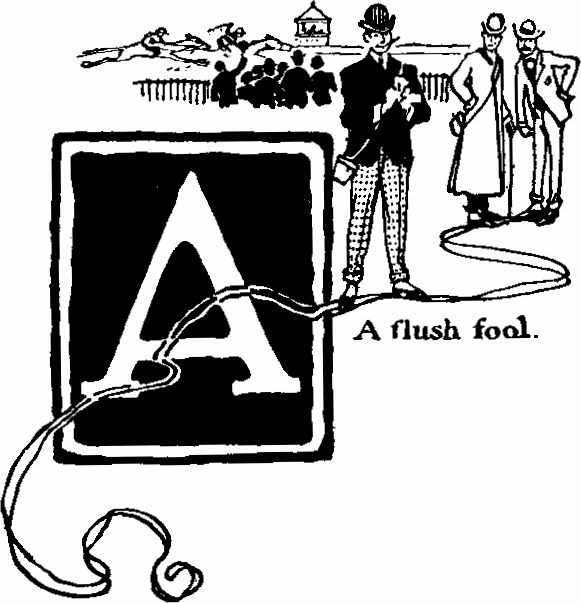
A man can drop a lot of dough trying to pick up money.
A fool and his money are soon spotted.
An accommodation liar soon learns to run like an express.
A guilty conscience needs no accuser if you catch him at it.

An adjective, commonly called the indefinite article because the higher the fewer.
A BAS. A French word meaning "S'cat!"
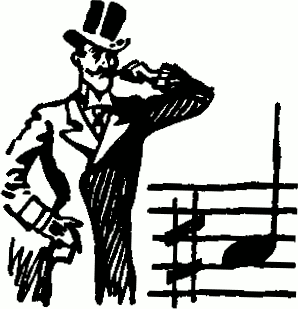
A SHARP. A musical term which cannot be explained here, because the Musical Union might get sore.
A FLAT. A people coop. Seven rooms and a landlord, with hot and cold gas and running servants. A flat is the poor relation of an apartment.
ABROAD. A place where people go to be cured of visiting foreign lands.
ABSCOND. To duck with the dough. From The Latin word absconditto, meaning to grab the long-green and hike for the Bad Lands.
ABSINTHE. The national headache of the French. A jag-builder which is mostly wormwood and bad dreams. A liquid substance which when applied to a "holdover" revivifies it and enables its owner to sit up and notice the bar-tender.
ABSTAIN. The stepladder which leads up to the water wagon.
ABSTEMIOUS. Having an aisle seat on the water wagon.
ACROBAT. A fellow of infinite chest.
ACCUMULATE. To collect or bring together. For example: "He borrowed two dollars from his wife, whereupon he went out and accumulated a bunch of boozerine." (Carlyle's Heroes and Hero Worship.)
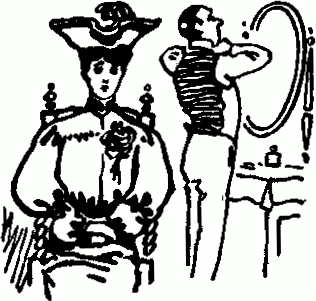
A THING OF BEAUTY. A joy forever until we get used to it.
ALCOHOL. The forefather of a hold-over. Boozerine, in the raw state. From the Latin words alco and haul, meaning "he is soused to the booby hatches, haul him to the alcove." (See Lord Macaulay's Jags of Ancient Rome.)
AMBITION. The only disease which laziness can cure.
AMUSEMENT. The hard work a man does on the golf links to give himself an appetite for sausage links.
ANGEL. Something behind a show—and always something behind.
APE. To imitate. For instance: The man who imitates his betters is the easiest man to make a monkey of.
APPLAUSE. The fuss which we think the world ought to make over us for doing our duty.
AUTOMOBILE. A horseless idea which makes people go fast and the money go faster. A tide in the affairs of man which, taken between the shoulder blades and the curbstone, leads on to the hospital.
AXE-GRINDING. The art practiced by those who give you a cookie so they can touch you for a barrel of flour. The axe-grinding industry had its origin in the Garden of Eden. The Serpent was extremely partial to Autumn, so he gave Eve a nice red apple, and in exchange she gave the Serpent an early Fall. (See Lord Macaulay, page 34.)

AIRSHIP. A machine invented for the purpose of flying through the newspapers.
See M. Santos Dumont. In case he isn't in when you call a part of his autobiography is printed herewith: "My first yearning," writes M. Santos—see page 97—"was for an opportunity to rise in the world.
"When but a little boy my dearest wish was to get up to the top of the ladder and then have someone remove the ladder. If I stayed up I knew I was successful. If I came down I didn't know anything for a week or two."
The reader will notice a peculiarity about this gentleman's name. It starts off with "M" and then there is eight bars rest until it comes to Santos. This is a French custom. Every man in France begins his first name with "M" and then refuses to tell the rest of it. It seems such a stingy habit.
Let us quote more from M. Dumont's own story:
"My first desire to get off the earth happened while I was extremely young.
"One day while out in the Brazilian diamond fields picking the luscious white stones from the trees it suddenly occurred to me what a frivolous life I was leading.
"Diamonds, diamonds everywhere and not a place to pawn.
"I became restless.
"My father owned the diamond plantation so I went to him and explained what a tired feeling I had, and how I longed to rise in the world.
"Father at once turned about fifteen volts into his right shoe and I rose for a distance of four feet.
"I returned almost immediately, but this short flying trip made a deep impression upon my mind, and otherwise.
"Ten years later I left home just to convince my father that I could rise in the world without his kindly collaboration.
"One day while in New York I went up to the fifty-ninth floor of a sky-remover building.
"The elevator was extremely nervous that day.
"While coming down I was pained and surprised to observe that my stomach did not travel with me.
"I spoke to the charge d'affaires of the elevator about it.
"I complained bitterly to him about such an inhuman invention which rushed through space with a man's exterior and left his interior to bump its way downstairs.
"The charge d'affaires of the elevator told me if I did not like it to get out and fly.
"That was the inspiration which drove me to build the flying machine.
"Two weeks later I went to Paris, because that is the flyest city in the world."
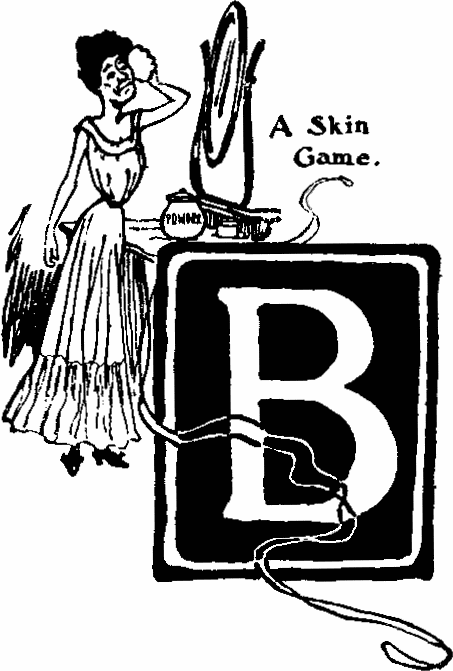
Beauty is only a skin game after all.
Bad beginners make bad finishers.
Birds of a feather flock together on the theatre hats.
Be sure you're ahead—then go right.
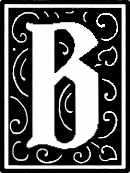
The second letter of the alphabet. It is called a vocal labial consonant, which, no doubt, serves it right.
BAA. To make a noise like a sheep.
BOW-WOW. To make a noise like a dog.
BIFF. To make a noise like a boxing glove.
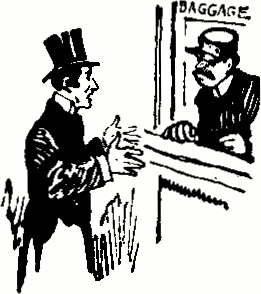
BAGGAGE. Two shirts, some underwear, one suit of clothes, six collars and a hair brush which you lost somewhere between here and Chicago.
BAD ACTOR. A man who is egged on by ambition and egged off by the audience.
BADINAGE. Light or playful discourse. For example. "Why does a chicken cross the street? Because the butcher."
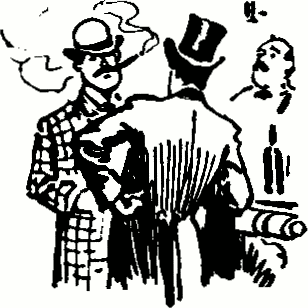
BAR. A place where men go to get a thirst so that they can go there again to quench their thirst.
BEETHOVEN'S SONATA. An excuse some women use for beating the face off a piano.
BIGAMIST. A man that adds one and has two to carry.
BLONDE. An abbreviation of peroxide of hydrogen.
BREEZE. A condition in the atmosphere which generally arises on a cold day, to make it colder and stays away on a hot day to make it warmer.
It is supposed to inhabit the windows, but when you look for it on a Summer night all you can see is the "gent" next door chaperoning the growler.
BUNDLE. A load of preserves. From the Norwegian bun, meaning high tide. "Yesterday he annexed a bundle and this morning he sits on the front steps singing soft lullabies to a hold-over." (Shakespeare, page 18.)
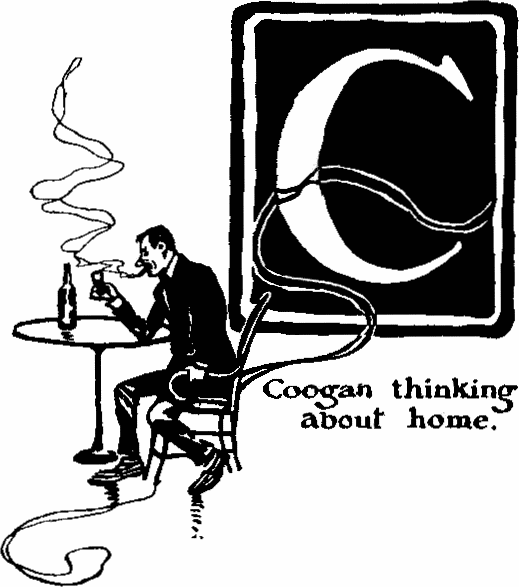
Charity begins at home and ruins its health by staying there too much.
Children who are wayward grow up to be the people who fall by the wayside.
Coogan says there is no place like home—and he congratulates the other places.
Consistency is a jewel, but it isn't fashionable to wear it.
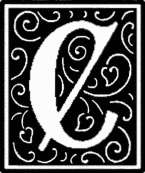
The third letter of the alphabet. It is also used in music, especially by prima donnas who try to reach it and fall flat.
CAB. A machine invented for the purpose of going somewhere, but which seldom gets there. An inland tugboat.
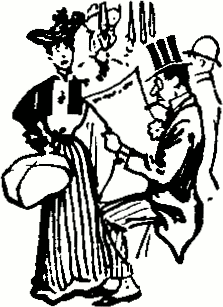
CAD. A shine with an extra polish on.
CALAMITY. A loud-mouthed individual who insists upon telling stale jokes.
CASH. The stuff we work for, work other people for and are worked for. Synonyms: Bones, Cash, Coin, Dough, Ducats, Long-green, Mazuma, and 1,000 others.
CHARITY. Something which begins at home and stays at home every day except Sunday, when it goes to church to talk about itself.
CINCH. When a man starts out with a bundle of money and a bundle of booze it's a cinch that he drops the money first.
COLD FEET. A punishment for those that stand around and wait for dead men's shoes.
COMPLIMENTS. Things which some people fish for hard enough to catch a sea-serpent.
CONFIDENCE MAN. The noblest work of fraud.
CONCLUSION. Something a woman jumps at in the same manner in which she jumps off a street car—which is backwards.
CONSCIENCE. The alarm clock on a man's mind which is seldom wound up.
CONSISTENCY. A jewel which isn't appreciated as a Christmas present.
CONTENTMENT. A large, open-faced gentleman telling his friends how he self-made himself.
COPPER-FASTENED CINCH. A good-looking widow who has made up her mind to marry again.
COURTSHIP. Love's excursion boat just before it strikes the rough sea of matrimony.
CROOK. A man who says nobody is straight.

COOK. Something which makes up her mind to stay in the kitchen and then loses her mind. A product of modern society who has for her motto "Dimuendo contralto dumdum," which means, "She who cooks and runs away will live to cook another day."
CROW. A bird politicians would eat after election if they were not so busy drinking.
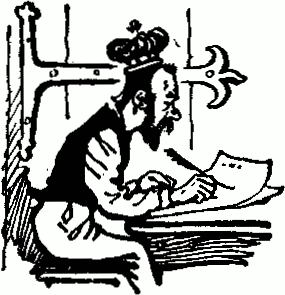
CZAR. An illustration of the old proverb, "Uneasy lies the King when falls the Ace."
The following letter written by the Czar to Tolstoi probably illustrates better than any other document the pleasant and health-giving conditions under which the Czar lives and reigns:—
In The Cellar, To-day.
Dear Tolsey:—My hands tremble a little in the armor-plated gloves, so you must excuse bad spelling.
They have just handed me a small bunch of asbestos writing paper, and the fountain pen has been sterilized to remove the poison, so I will write you.
Great Scottovitch! you can never enjoy the feeling of anxiety which gallops over me when I wake in the morning and wonder will the hard-boiled eggs explode before I eat my breakfast.
At six o'clock this morning I was awakened by a scratching noise on the iron quilt which covers my repose. A cold perspiration broke out on my forehead. I buried my head in the hardwood pillows and waited the end. Just then M. Stepupski, the Minister of the Department of Bum Shells, walked in through the secret tunnel in the wall.
I threw the aluminum blanket off my face and cried: "What is it? What is it?"
"Pardonoviski, Your Majesty," said M. Stepupski, "it is the cat! Whether it is a trained cat carrying a deadly bombshell in the forward turret, I don't know, but we will investigationiski at once."
My minister coaxed the cat away and five minutes later a loud explosion confirmed M. Stepupski's theory that the cat's bosom contained something more than nine lives.
It also confirmed M. Stepupski, because he has been strangely absent ever since together with a stained-glass window and a lot of new furniture.
Take my advice, Tolstoi, and don't be a royalty.
I say this as one friend to another and not because I have to wear copper-fastened pajamas.
I don't mind the copper-fastened pajamas so much, but to wear asphalt neckties and barb-wire suspenders is something which aggravates the spirit.
At 8 A.M. this morning M. Cornmealski, the Minister of the Department of Armored Breakfasts, reported that he had discovered something suspicious in the dish of peeled prunes.
We examined the prunes carefully and found them stuffed with free tickets to ride on the Brooklyn Elevated Railroad. We burned the tickets hastily and saved our lives again.
M. Cornmealski reports that up to date 219 different breakfast foods have been received at the palace kitchen. He says they range all the way from consolidated shavings to perforated sawdust, with here and there some compressed knot-holes.
In a mad moment yesterday I took the Yale lock off my appetite and ordered up one of those breakfast food samples, but just as I had the spoonful at my lips I remembered the prayer of my youth: "Woodman, spare that tree!" and once more my life was saved.
Ten minutes ago M. Blackandblueski, the Minister of the Department of Witch Hazel, rushed into my bulkhead compartment.
"Oxcooski, Your Majesty," said the Minister, "but this morning the cookski was burning a few links of sausage for breakfast. Well, Your Majesty, about two minutes afterwards the cookski and the stove and one side of the palace left in a hurry and went away in a northwesterly direction. We don't expect them back, because the sausage was stuffed with rapid transit material, Your Majesty!"
Thus it goes all day. Don't you think it is pretty hard lines when I have to make them wash the water on both sides before putting it in the teapot?
Now I must stop because I hear the humming of the harpoons on the outside. My officers are talking about me again. Farewellski!
CUSTOMS INSPECTOR. An individual who gets a salary for believing that everybody on the steamboat is a smuggler.
In order to study briefly the Custom House system as applied to returning travellers let us witness the arrival from abroad of the Secretary of the Treasury.
Some years before the Secretary went into politics deep enough to stay there and make expenses he took a slight trip to Europe.
Two weeks later he was on his way home to his beloved land on the good ship "Kaiser Wilhelm, the Grocer."
The Stars and Stripes seemed to wave a welcome to him as he approached the hospitable shores of Fire Island.
"It is good, so good to breathe once more the air of Liberty!" said the Secretary, and ten minutes later the "Kaiser Wilhelm, the Grocer" was at her dock.
"Ah! how happy I am to be once more where Freedom reigns!" said the Secretary as he walked proudly down the gangway plank.
"Wait!"
The speaker was a short-set man with a thick face and a wide voice.
The Secretary paled his cheeks.
"Who are you?"
"I am an American citizen; leave me pass!" exclaimed the Secretary.
"So am I," said the man with a thick face; "and nothing passes me. You have been to Europe, have you not?"
"Do you think I used the 'Kaiser Wilhelm the Grocer' to come from Staten Island?" asked the Secretary.
The man laughed, loosely.
"Swear!" he said.
"At you?" inquired the Secretary.
"Swear you are not a smuggler," said the roan.
"I ought to kick you for such an insult," said the Secretary.
"Business before pleasure," said the man; "swear that you are not a robber."
"I swear," said the Secretary; "inwardly, outwardly, earnestly and pictorially, I swear!"
"By the memory of George Washington you swear that you are not a smugglesome man?"
"I do," said the Secretary.
"Hold up both hands and swear!"
The Secretary did so.
"With both hands behind your back and your eyes fixed on the Declaration of Independence sign this sworn statement," said the man.
The Secretary did so.
"Now that you have sworn I will go through your trunks to see if you are a liar!" said the man.
"Surely, you should receive one of my best kicks," said the Secretary.
"Formality first, fun later," said the man, upsetting the largest trunk.
"Aha! what is this?"
"It is a pair of open-work socks," said the Secretary.
"Opened in Europe—yes? Bad business! bad business! I begin to suspect you. What is this?"
"That is a pipe which I bought in Baden-Baden," said the Secretary. "I am taking it to my cousin in Springfield, Mass., for a souvenir."
"I will help your cousin to stop smoking," said the man, putting the pipe in his pocket. "Aha! what is this?"
The Secretary blushed his face.
"What is this?"
"That is my pair of pajamas!" said the Secretary.
"Pajamas?"
"Put them back, please?" said the Secretary. "A man's pajamas are not for the vulgar gaze of the world!"
"Pajamas!" said the man.
"My pajamas!" said the Secretary.
"They look like a Chinaman's Sunday trousers—yes?"
The Secretary looked into the pitiless faces of the multitude which was gazing into his trunk, but they handed him nothing save small bunches of laughter.
"Come!" said the man, "where is the Chink that goes with this wearing apparel? Did you hear over the wireless [pg 29] system about the labor strikes and try to smuggle in some cheap labor?"
"I assure you that I wear those pajamas myself!" said the Secretary, interrupting a sob in his throat.
"You wear these pajamas? When? Why? Where?"
"In the secrecy of my boudoir," said the Secretary.
"Aha!" said the man, "so you have some boudoir, too! Bad business! bad business! I have never heard of a Boudoir Trust, therefore, we do not make such a thing in this country. My suspicions are getting louder. What is in this bottle?"
"That is my cough medicine," said the Secretary, giving a sample of the cough.
"It may be wine or cream de mint because your voice sounds nervous."
"I am nervous because the world is still giggling at my pajamas," said the Secretary.
"Back to the pajamas! Bad business! bad business! I will have to dig a tunnel through your neckties to see if you have a cafe au lait or a cafe chanteuse in the trunk. When a man gets nervous it is always wise to watch him. Open your mouth!"
The Secretary did so.
"What have you been drinking?"
"A vermouth cocktail," said the Secretary.
"Domestic or imported?"
"Neither; the Captain treated," said the Secretary.
"It looks to me much like foreign spirits," said the man.
"Do you wish to open me further and see?" inquired the Secretary.
Then the man waded into the Secretary's other trunks, two-stepped over his negligee shirts, waltzed through his waist-coats and did a polka amidst the ruins of his dress suit.
"What is the verdict?" said the Secretary after the battle was over.
"Not guilty, but you might be," said the man, smiling briefly.
As the Secretary walked out the Stars and Stripes [pg 30] seemed to bow politely at him and whisper with a voice slightly sarcastic: "You for the seat away back!"
"Some day," said the Secretary, "I will jump into politics so far that my trunk will always be a dark secret to the Custom Housers!"
And he did it.
From the life of the Secretary we learn the lesson that there is much Liberty in this country, but, incidentally, there are a couple of bald spots where it is missing.
If you don't believe me come home from Europe some day by way of the Custom House.
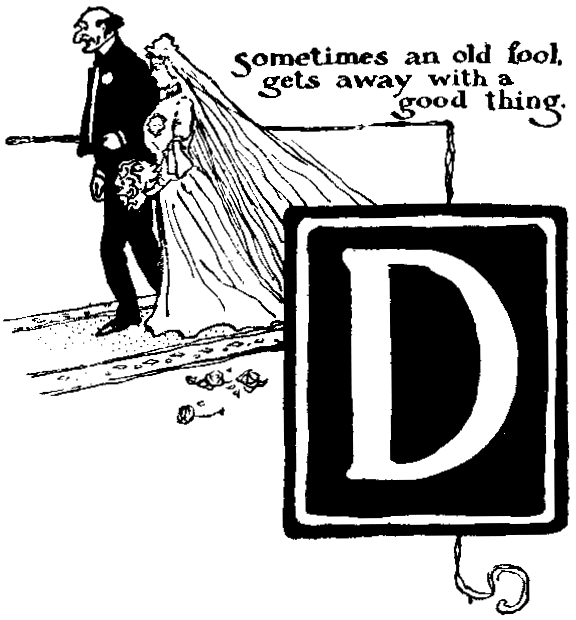
Do you know that a wise man can sometimes be a fool and get away with it?
Don't go among doers if you don't want to be did.
Duty calls and finds most men holding nothing but a four-flush.
Don't try to be a stinger if you don't want to get stung.

The letter of the alphabet which always runs fourth.
DAISY. A twin sister to a peach. See Dream.
DAM. A species of floodgates. By adding the letter "n" the floodgates are loosened.
DAMSEL. See Daisy.
DARLING. See your best girl.
DAFFY. See a doctor.

DAWN. The cold, gray period immediately following a red-hot night.
DELUDE. To take your wife by the hand and lead her away from the truth.
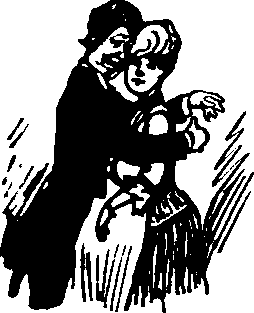
DELUSION. Something which every man likes to hug—especially if she's pretty.
DESTINY. Something which laughs at those who never say die.
DESCRIBE. To give an account of. For instance, one woman giving a description of another woman's wearing apparel—oh, fudge!
DOGS OF WAR. Animals that live on bones of contention.
DRUNKARDS. The monuments which whiskey erects all along the road to ruin.
DUST. The material from which man is made and that is the reason why woman sweeps all before her.
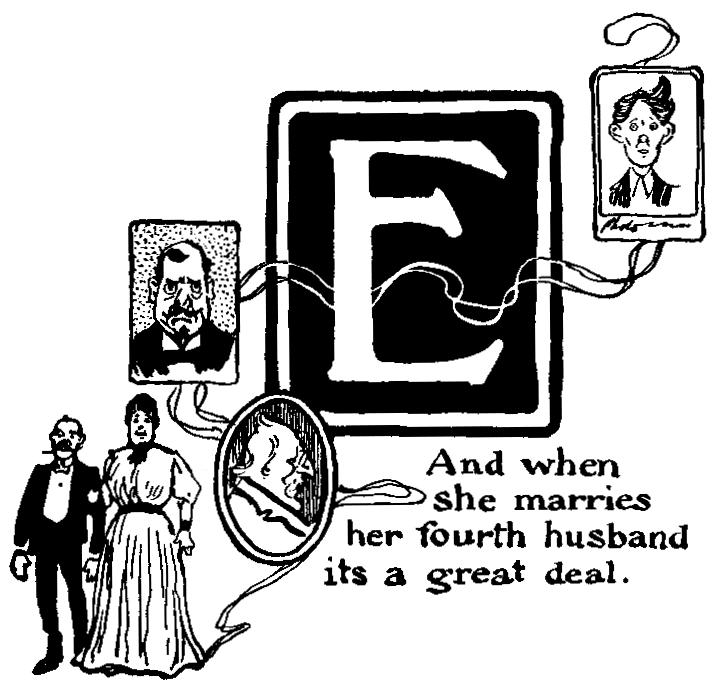
Everybody knows that money talks, but nobody notices what kind of grammar it uses.
Evil be to him who evil drinketh.
Every woman loves an ideal man until she marries him—then it's a new deal.
Every time you stop and stare at Success it gets up and leaves the room.
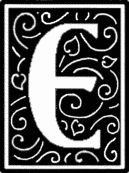
The fifth letter of the alphabet which is usually silent at the end of a word—quite unlike some women you know of, eh!
EAR. A place which hears a great many things which should never have been said.
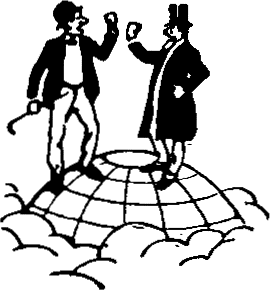
EARTH. An orange-shaped ball hanging in space and inhabited by two classes of people, to wit: kickers and more kickers.
EDEN. The garden where Adam and Eve baked the first apple pie and pied the human race.
ECSTASY. A state in which the mind is carried away. For instance, if you are in a runaway automobile, you are in ecstasy until you hit a telegraph pole; after that you're in a hospital.
EGOTIST. A man who uses his brain for the purpose of believing that he is the greatest ever.
ELBOW. Something you give a man you don't like.
EASTER. A season of the year devoted to new bonnets, overcoatless young men and pneumonia. A tide in the affairs of women which, taken at the pocketbook, leads on to the milliners.
ELOPE. A hurried trip taken by two lovers for the purpose of wiring Papa for funds to get home.
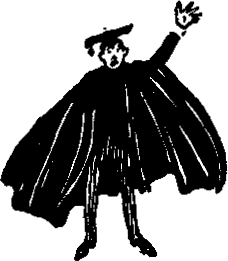
ELOCUTION. A disease which breaks out among students, but which is fatal only to the spectators.
EMPLOYER. A man who has a soft spot for a hard worker.
ENVY. The root of much criticism.
ECONOMY. A system practiced by some men which permits their wives to wear last year's dresses so that they can buy better cigars.
EXPERIENCE. The best of all teachers, because it's impossible for the scholar to run away from school.
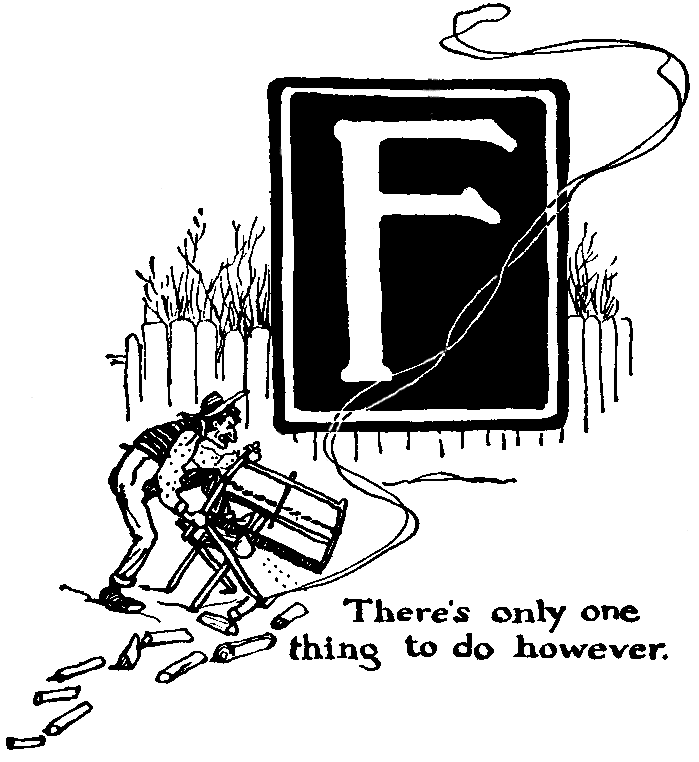
Fine feathers make fine birds take to the woods.
Failures made by other people pave the road to your Success.
Fortune wears rubber shoes and a feather pillow on each hand when she knocks on your door.
Fair play is a jewel, but so many people can't afford jewelry.
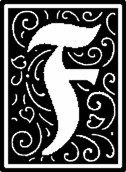
The sixth letter of the alphabet. It is formed by the passage of the breath between the lower lip and the upper incisive teeth, but that doesn't seem to worry it any.
FABLE. The story a man thinks his wife believes—and she lets him think it.
FAD. See hobby.
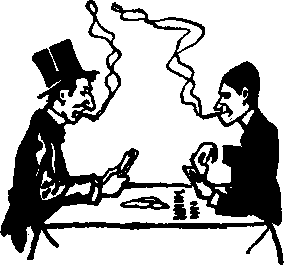
FADE. To gradually disappear. For example: "I had ten plunks when I went out last night, but they faded away." (Lord Palmerston, page 21.)
FAKE. Something we buy to make sure it isn't on the level.
FAITH. Something which is said to move mountains, but the railroad contractors always mix in a little dynamite to help matters along.
FAULT. Something which is so easy to find, but it is so hard to give it when we find it.
FAMILY. The only cure for race suicide.
FAVOR. Something we do for a friend so he can forget about it.
FLATTERER. A man who makes friends until he begins to talk about himself.
FORGER. A man who tries to make a name for himself, but who picks out the wrong name.
FRIEND. A man who knows you are a liar, but hopes otherwise.
FRIENDSHIP. The name of the handle some people put on other people for the purpose of using them.

FOOTBALL. A system of manslaughter very fashionable with boys. From the Latin words "footibus," meaning "put the boots to him," and "balloona," meaning "up in the air, or, who hit me with a public building?" A body of college students surrounded by ambulances. For instance:
Sing a song of football
Pockets full of salve;
Four and twenty legs all
Punctured at the calve.
Captain in the hospital
Fullback in the soup,
Twenty-seven faces
Broken in the group.
Sophomores and Freshmen
Punched around the ring;
When the war was over
The boys began to sing!
Raw! Raw! Raw!
Raw! Raw! Raw!
Stew them!
Fry them!
Raw! Raw! Raw!
Oysters!
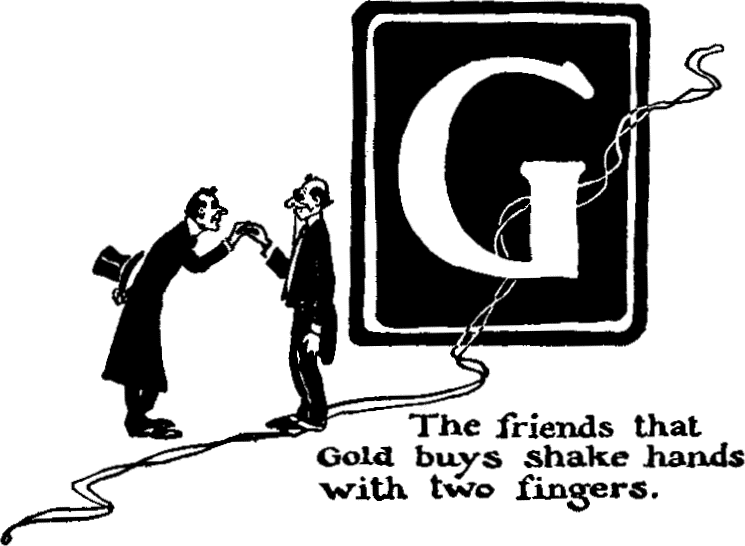
Great oaths from little aching corns do grow.
Great minds run in the same channel—especially if they are sea captains.
Gold is a dull metal, but it can cut friendship quicker than a knife.
Good names are better than great riches and that is why so many of us have names without price.

The seventh letter of the alphabet. Used by the ancients as an expression of surprise, thus: Hully Gee!
GAB. The product of a ball-bearing chin.
GAG. A joke rendered insensible by a third-rail comedian.
GAS. A substance we make light of until the bill comes in. "You may hide your light under a bushel, but you'll get a bill from the gas company just the same." (Shakespeare, page 9.)
GAS BILL. Something that comes in to put us out.
GAS METER. A bit of machinery invented by Ananias in order to please Saphira and keep the household supplied with lies while the old man was down in the grocery store.
GET-RICH-QUICK. An aquarium for suckers. A place where poor people go to get poorer.
GEE-GEE. A horse by any other name will run as fast.
GENIAL. A guy that never was known to buy.
GENIUS. Something we have in our family—if you don't believe me, come and hear our little boy recite.
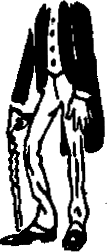
GENT. Two-thirds of a gentleman.
GENTLEMAN. A title which many a man claims because the public hasn't time to prove him otherwise.
GERM. See microbes. In order to see microbes you'll have to get a magnifying glass.
GOSH. A Yankee synonym for dad bust it! See dag my buttons! See any Reub.
GOSSIP. Something which a woman hears with one ear and tells with both. A woman who can put two and two together and make five.
GOOD TIME. About $9 worth of headache next morning and eighteen cents in small change left in the pocket.
GOURMAND. A man who delights to make his stomach feel like a department store.
GRAND OPERA. A disease which breaks out in society every winter and can be cured only by inward applications of a seat in a box and outward applications of diamonds on the chest.
Bjingle Bjangle, the celebrated Norwegian raconteur, thus describes in his book of travels a visit to the grand opera in New York, as follows:—
I went to the opera last night and enjoyed it unspeakably.
I noticed that most of the ladies in the boxes enjoyed it also, but not unspeakably.
The ladies, Heaven bless them! seemed to be suffering from that operatic disease which is called nervous conversation.
This is a disease which attacks the vocal chords just as soon as the curtain rises and causes the voice to fall out.
I also enjoyed the names of the singers.
Some of the names on the programme looked like a round robin sent out by a Turnverein bowling club, but I suppose if they were baked in the oven until translated they would mean something soft and soothing like a custard pudding.
Why is it that foreign singers and singerettes always have a name which listens like a cuckoo clock with a sore throat.
Perhaps if we knew how to unlock them these names would mean just plain Schmidt or Jones.
There was one singer on the programme that had the most extravagant name I ever witnessed.
If you read it off quick it sounded like the finish of the six-day bicycle race at the Madison Square Garden.
Then if you looked at it sideways it seemed to be the report of a skirmish between the Russians and the Japs.
I think that fellow just waded into the alphabet with a dip net and all the letters he caught he kept.
I liked the plot of the Opera.
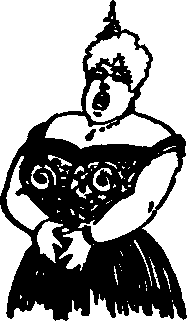
She was a blonde lady with one of those embonpoint faces which must cost a good deal to keep in repair.
The hero was a young gentleman with a sweet expression and a forehead which had moved into his hair when it was very young.
I don't know which was the villain, but I have my suspicions that it was the usher who gave me a seat.
I was interpolated in between a fat man who spoke with an onion accent and a narrow-headed man who whistled softly to himself all the evening without taking 32 bars rest.
My enjoyment under these circumstances was delicious.
The story of the Opera was simple.
A lot of young ladies all ready to go in bathing changed their minds and came out on the stage.
Then a tall gentleman came out and warbled at them and the young ladies went away.
Perhaps he belonged to the crusaders on vice.
Then the lady that drew the largest salary came out and made goo-goo eyes at the tall gentleman.
He was so embarrassed that he walked right down to the footlights and took a couple of high notes.
She took the same.
Then four people came out on the stage and yelled together with so much earnestness that the women in the boxes had an attack of nervous exclamation, and the way they talked about whoever was not present was pitiful.
When you would least expect it the hero jumped on the stage and made some quick motions with his face and arms which resulted in a solo.
The story he told was simplicity itself.
Plainer than words could make it his beautifully imported voice kept saying "Aha! aha-eo! I-am-getting-one-thousand-dollars-a-night—tra-la-la-la!-aha!-aha-eo! For-doing-this,—for-doing-this-with-the-pipes-I-get-one-thousand-plunks-oh-plunks-per-night-aha!-aha-eo!"
Then the soprano responded with much emotion from the orchestra, "Ditto, ditto, ditto! me too, me too! oo-oo-me too!"
It was delicious.
But just then came the bitter moment when all my deliciousness was crushed because the narrow-headed man on my left switched softly into "Hiawatha" with a few personal additions to the coda.
So I stood up and went home.
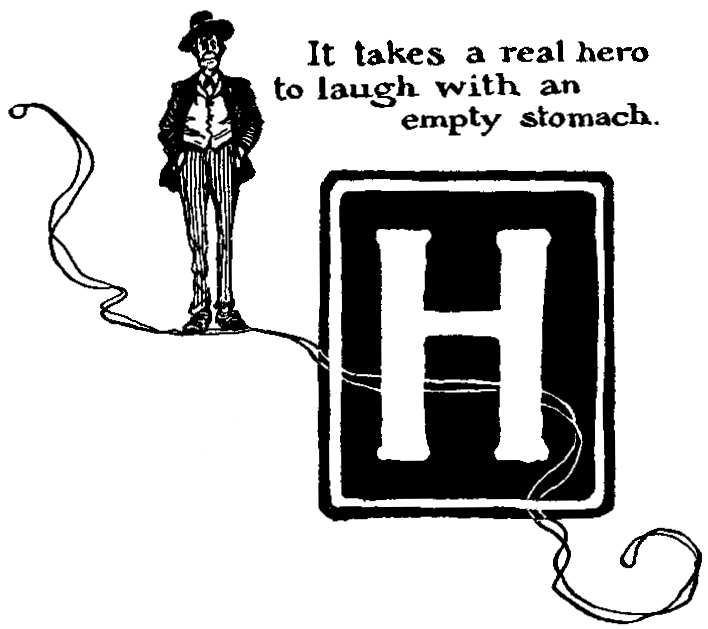
He laughs best who laughs with a full stomach.
How many people in this world are being coaxed when it's a club they need!
Here are two things any man can find in the dark—a carpet tack and a limburger sandwich.
"Handsome is as handsome does them"—the motto of the bunco steerer.
[pg 50]
The eighth letter of the alphabet, which is all broken up because Englishmen have dropped it so often. (Get ap!)
HA! An exclamation of surprise used in connection with other dark blue words when you step on a tack.
HA, HA! Something the world tries to give you on the slightest provocation.
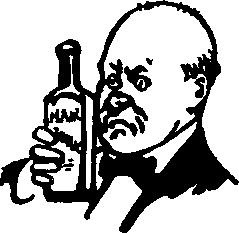
HAIR. The fur that pays a temporary visit to a man's head for the purpose of falling out later on.
HARD JOB. Trying to live without working.
HARD WORK. The sugar of life, but it is surprising how many people prefer lemons.
HEALTH. The ability to eat meat for breakfast without having to rush to the drugstore.
HEAT. A scheme invented by Nature for the purpose of sending human beings to the seashore, the mountains and the hospital. It is from the Latin words "Gee Whizzibus Aintit Fierceibus?"—which means much or little, according to the size of the hotel you stop at.
HERO. A person whom we all delight to honor because the facts in the case prevent us from throwing the hammer at him. A man who goes into history and cannot get out again.
HIGHBALL. A drink in the hand which is worth two headache powders in the drugstore.
HOG. A man who thinks everybody should move over and give him the end seat.
HONESTY. The best policy after they catch you trying the others. The excuse that a politician always has up his sleeve.
HOPE. A firm belief in to-morrow with the ability to take gracefully a transfer to the day after to-morrow.
HORSE-SHOW. A place where the women show the horse that he has no show. Society's parade grounds, where one dress is as good as another until the price is known.
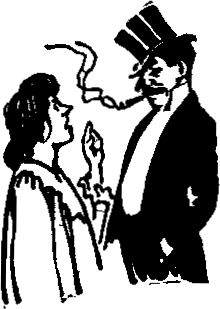
HUSBAND. A domestic animal, invented for the purpose of giving a wife something to worry about. See Fourflush. Also look in the discard.
HUMIDITY. Something which comes in through the window and goes out through the pores. A warm proposition any way you take it. A brother-in-law to Torture and a half-sister to Hades.
The word comes from the Swedish language, "Sockett Toodem," which means "Melt, you Spitzbuben, melt!"
HYPOCRITE. A knocker which is out of order except when your back is turned.
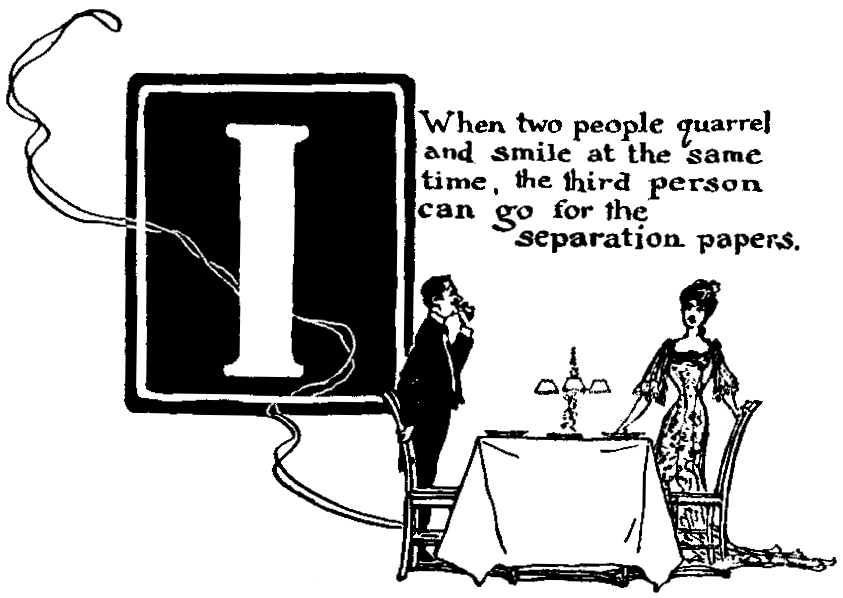
It is a wise son that owes his own father.
It takes a lot of money to teach a Duke how to love an American heiress.
If we could see ourselves as others see us many of us would wear a mask.
It takes three people to engineer a quarrel—two to make it and one to run for a policeman.

The ninth letter of the alphabet. Used principally by touchers in connection with O and U. Thus, I. O. U.
ICE. A substance the world uses to put a damper on swelled heads.
IGNORANCE. A lack of knowledge. For instance: The man who never heard of a microbe sometimes has the colic, but he never gets appendicitis. (Milton, page 7.)
IMPOSSIBILITY. A stuttering man trying to make a bluff.
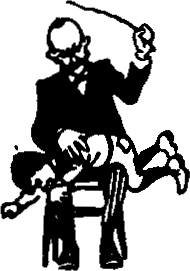
INCONGRUITY. A man who prays with such noise in Sunday School that he sprains his voice and then goes home and beats his child for talking too loud on the Sabbath day.
INDOLENT. A lazy man just before he becomes a loafer.
IRONY OF FATE. A man with an invitation to a beefsteak dinner who has to stay home because his wife has acute indigestion.
INDIAN COMMISSIONER. The gentleman who invented the idea of opening up barber shops near the Indian reservations, so that Lo could get his hair clipped by a reaping machine once every year, whether he needed it or not.
The idea of Marconi's wireless telegraph system pales into insignificance before the idea of coaxing a wild Indian away from the reservation and running the remorseless horse-clippers over the wild foliage to which his head has been acclimated these many years.
This is a noble suggestion, and no doubt the Indians will take kindly to the barbers and pay them much attention even if their tommyhawks and scalping knives are a little dull at first.
In the dramatic language of the plains Biff Hawkins, of Spotted Dog, Idaho, thus describes the opening of the first barber shop in the vicinity of an Indian reservation:
"Hist!"
The speaker was the bootblack in one of those handsome hand-painted barber shops which a loving government at Washington has placed at intervals along the border of the Indian Reservation.
"What is it, Mike?" said Sniffles, the barber.
"Hist!"
Again that ominous word, and Mike pointed feverishly at the distant horizon.
On it an Indian was walking, steadfastly, onward, onward, onward!
Remorseless as a gas bill the Indian came onward to the barber shop.
Sniffles, the barber, jumped quickly into his armor-plated working clothes, and Mike, with a sad smile of farewell, crawled into the cyclone cellar and closed the steel doors.
The Indian entered the barber shop.
"You are next!" said Sniffles, politely.
"I know it," said the Indian; "but I was put next only [pg 57] an hour ago—hence the delay. The bay rum, please!"
"You want it for the hair?" inquired the barber.
"No, I want it for a souse," said the Indian.
"Get in the chair, please!" said the barber.
"Man-Behind-The-Snip-Snap speaks foolish," said the Indian. "I am not for a hair cut; I am for that bay rum idea. Heap thirst! Don't keep me waiting!"
The barber turned pale as the awful truth flashed across him.
"What is your name?" he said painfully.
"Man-Afraid-Of-A-Shampoo," said the Indian, sullenly.
"Nice Indian! pretty Indian! good Indian! You are not compelled to get your hair cut, you know!" said the barber, wishing to avoid bloodshed.
"Paleface give me heap pain," said Man-Afraid-Of-A-Shampoo, fiercely.
Sniffles, the barber, trembled and believed him.
"Ugh!" said the Indian.
"Ugh!" has the same meaning in Indian as the word "Oof!" has in English.
"When I came in paleface said I was next," said Man-Afraid-Of-A-Shampoo. "Well, I am next to this business. You have bay rum and I have a thirst—let us get together!"
"But the bay rum is used only on the outside of the head," said the barber.
"I have original ideas about bay rum," said the Indian, "therefore I have decided to use it on the inside of my neck!"
"But bay rum is five cents extra with a hair cut," whispered the barber.
It was his last whisper in that shop.
Shouting the battle cry of the Cherokees, the Indian, grabbed the bay rum bottle and poured it carefully over his thirst.

This was followed by a bottle of hair tonic, which seemed to go to his head.
Then the Indian swallowed a bottle of whisker dye and all seemed to grow black before him.
The barber groaned in agony.
It was thrilling.
When last seen the Indian was drinking a bottle of dry shampoo and foaming at the mouth, while he blessed the White Father at Washington for inventing the barber shop.
That afternoon Sniffles, the barber, and Mike, his under secretary, walked back to Washington and handed in their resignation to the Interior Department.
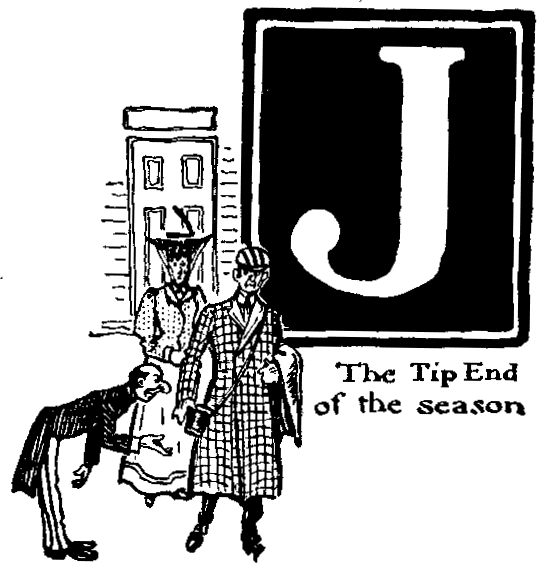
Jolly not that you be not jollied.
Justice is blind for the reason that some lawyers would give her a pain if she could see them.
Journeys end in porter tippings.
Just as you value yourself justly just that much are you valuable.
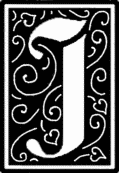

The tenth letter of the alphabet, used almost exclusively to designate a Reub with rubber in the neck—whatever that may be.
JAG. See gold cure. If that hasn't any effect, see an undertaker.
JOCKEY. A hero or a slob—it all together depends on where the horse finishes.
JOKE. Something that's extremely clever—when we make it ourselves.
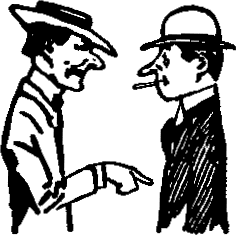
JOLLY. Flattery with a smile on its face.
JOLT. The thing a man gets who thinks he knows it all.
JOY. Gladness with the lid off.
JUG. A place to keep the material before it becomes a jag.
JUDGMENT. An ability which some men get credit for having when in reality they are merely lucky at guessing things.
JUSTICE. The name we give it when the verdict is the way we want it.
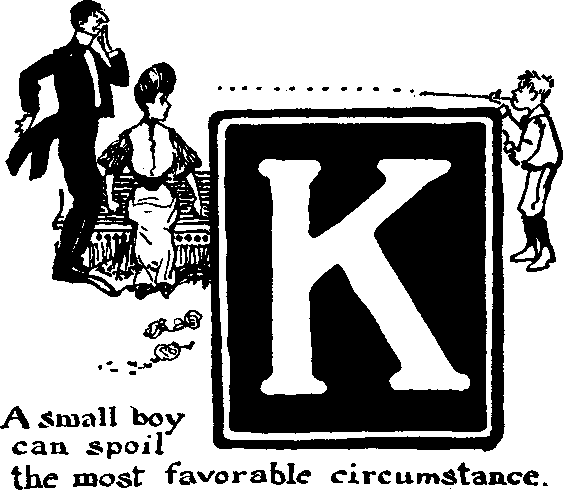
Kisses go by favorable circumstances.
Kidders are as happy as kids till somebody kids them.
Keep a stiff upper lip—especially when you're shaving yourself.
Knockers never have weak lungs.

The eleventh letter of the alphabet, pronounced K, as in Knuckle.
KEEN. A grafter with a victim in sight.
KENO. What the grafter says when he's through with the victim.
KEEP. The motto of the Trusts.
KEY. An instrument used at 2 A.M. in connection with a door to determine whether a man is sober or not.
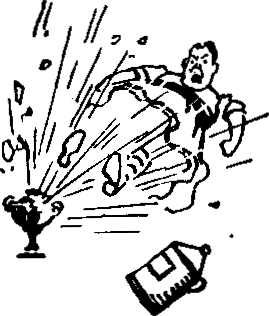
KEROSENE. An ambitious substance used by cooks when they want to go out through the kitchen roof.
KICKER. A man with a grouch on the inside and a voice on the outside.
KISS. A sigh set to music. The oldest monopoly in the world with the exception of John D. Rockerfeller. A kiss is the soul's cocktail. A wireless message from he to she, with a little peaches and cream on the side.
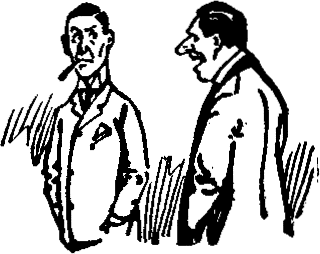
KNOCKER. A hurdle in the way of the worthy. A chin-critic. An expert with the harpoon.
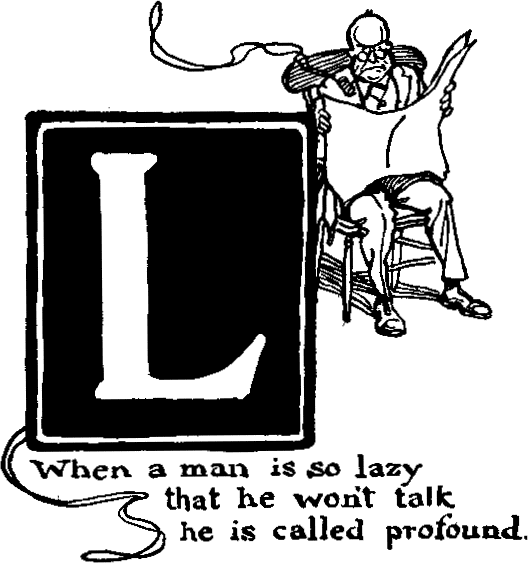
Love laughs at everybody except the girl's Papa.
Laziness generally attacks every part of a man except his tongue.
Lots of men spend two dollars' worth of worry over the loss of a quarter.
Look around and you'll see that the world likes to side with the man who has the cash.
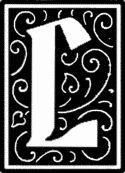
The twelfth letter of the alphabet, captured some years ago for the purpose of describing the Elevated Railroad.
LABOR. Trying to get back the money you loaned.
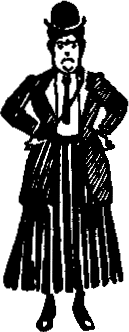
LADY. A gentleman woman.
LAMB. A young mutton-head that goes into Wall Street.
LARK. A bird of a name given to a bird of a time.
LIGHT. An excuse used by the Gas Company to collect money.
LITERARY FAILURE. A man whose brain was unfit for publication.
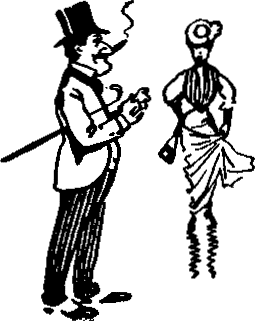
LOBSTER. A shine after he gets in the swim.
LOAFER. A man who believes the world owes him a living and sends another man to collect it.
LOVE. A certain party who is supposed to be blind, but he doesn't seem to have much trouble in finding someone to lead him around.
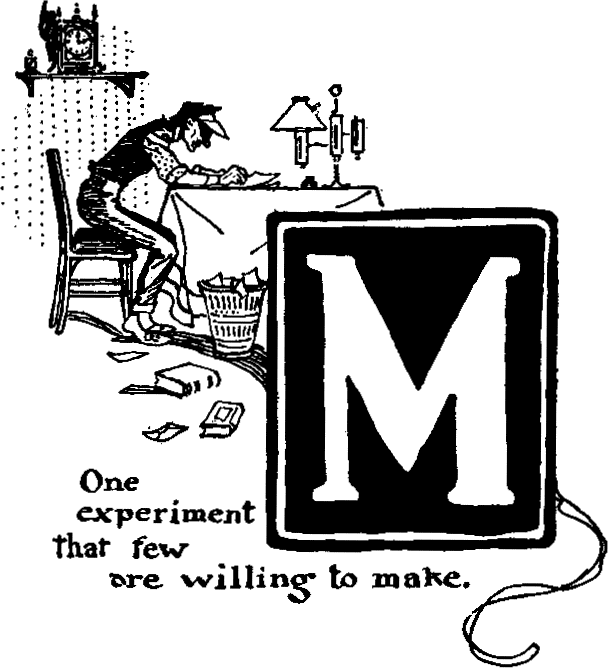
Money cannot buy happiness, but most of us are willing to make the experiment.
Many people would take a short walk on the road to ruin if they were sure their friends wouldn't see them.
Money is the root of much friendship.
Marry in haste and repent in Dakota.

The thirteenth letter of the alphabet, which very few people use because thirteen is unlucky.
MACARONI. An excuse for opening an Italian restaurant.
MAP. That part of the human face which is visible above the collar.
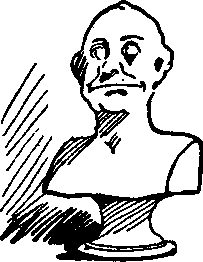
MARVEL. A man who never tells you his troubles.
MEDAL. A gold or silver dingus which you get for doing something you intended to do anyway.
MEDDLER. The fellow who butts in and says you're not entitled to a medal.
MISER. A man who has all the money he wants but wants more.
MONEY. Something which talks, but a poor man can't keep it long enough to know what it says.

MICROBE. A very small animal that devotes all its energy to moving into the system of an entire stranger. Once in it begins to do light housekeeping on the aforementioned stranger's epiglottis. (For the meaning of epiglottis consult the first doctor you meet. If he doesn't tell you he's no gentleman.)
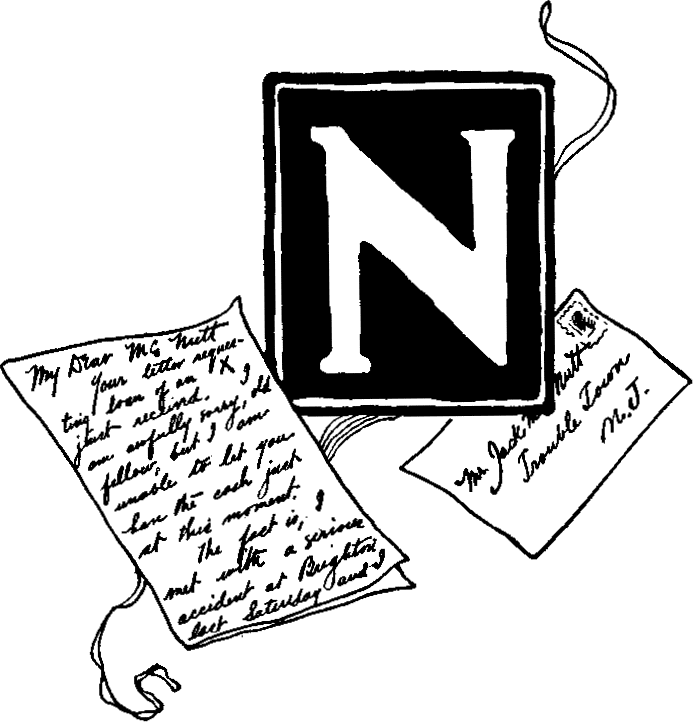
No matter how many good things our friends say about us, we are never surprised.
Nothing is so astonishing to us as another man's success.
Needless to say, a friend in need is a friend in the soup.
Nothing ventured nothing wonderful.
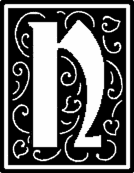
The fourteenth letter of the alphabet, sometimes called a nasal by those who ought to know better.
NABOB. A man who can put on a new suit of clothes every fifteen minutes.
NATION. A large principality ready to go to war at a moment's notice. For example: Carrie Nation.
NATURE. Something which makes no mistakes, with the exception of a crowded street car.
NECESSITY. The mother of many an empty stomach.
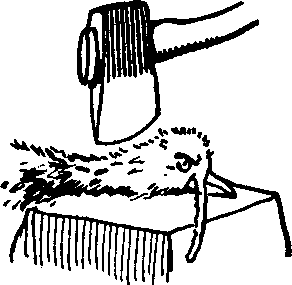
NECK. A place to get it in.
NEXT. The battle cry in a barber shop before blood is shed.
NIT. An abbreviation of Nix.
NIX. An abbreviation of Nit.
NOPE. An abbreviation of No!
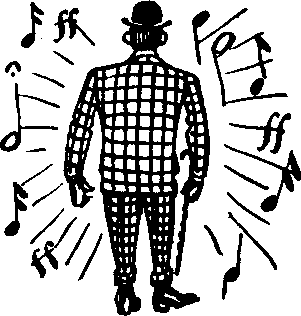
NOISE. The sound of a new suit of clothes on a loud man.
NODDLE. The place where some people think they think.
NOVEL. A book that sells better than it reads.
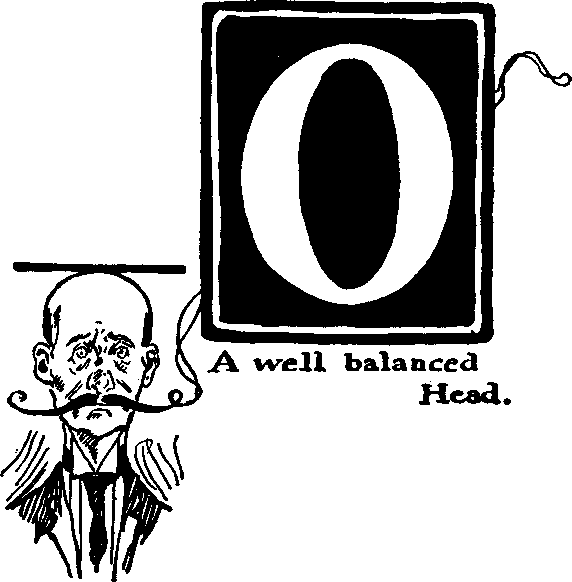
Of two evils choose the one least likely to be talked about.
Oh, yes, the man with a jag can hold on to the fence, but he can't hold on to his reputation.
Opportunity is something a Fool waits for while the Wise Guy runs down the road to meet it.
Occasionally we meet men who have to part their hair in the middle in order to have a well-balanced head.
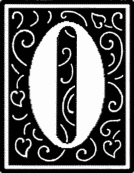
The fifteenth letter of the alphabet, used principally by the Irish in front of their names.
OH! The mild-mannered sister of Ouch!
OATS. A substance invented by Nature and intended for a breakfast food, but because pine shavings are cheaper it is now obsolete.
OBEY. A word put in the marriage service for the purpose of giving the parties of the first part something to kick about.
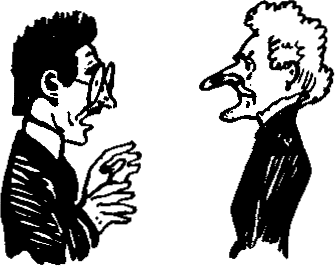
OCULIST. A man many young people should consult who think they have fallen in love at first sight.
OIL. See John D. Rockerfeller—if you can.
OLD HEN. The pet name a man has for his wife because she rules the roost.
OLIVE. A green grape dropped in a cocktail so the customer can pull it out with his fingers. See Cherry.
ONION. A noisy vegetable eaten principally by people who sit next to us in street cars.
OPERA. A device used for the purpose of making a fortune for a good singer.
OPPORTUNITY. Something never seen until it is not there to be looked at.
ORIGINALITY. The gift some people have of saying the bright things which we intended to think about later on.
OSLER. A modern abbreviation of chloroform. An up to date bogie man invented for the purpose of chasing "has-beens" to the woods.
OSLERESQUE. The state of being ready for Oslerizing. See any man over forty.
OSLERISM. The art of picking out a fit subject for the Osler treatment. "You can lead an old man into a drugstore but you can't make him drink chloroform." (Tupper's Proverbial Philosophy, page 19.)
OSLERIZE. To pour chloroform over an old man's breakfast food and telephone for the undertaker.
OSLERITIS. An attack of hysteria which broke out at a banquet and became epidemic in the newspapers.
OSLEROOZA. A man who believes in Oslerism. He is generally a young man in love with a girl whose Papa is over forty and who wears No. 11 shoes of a high voltage.
OSLERETTA. A young woman who believes in Oslerism. She is the same girl whose Papa has just been mentioned.
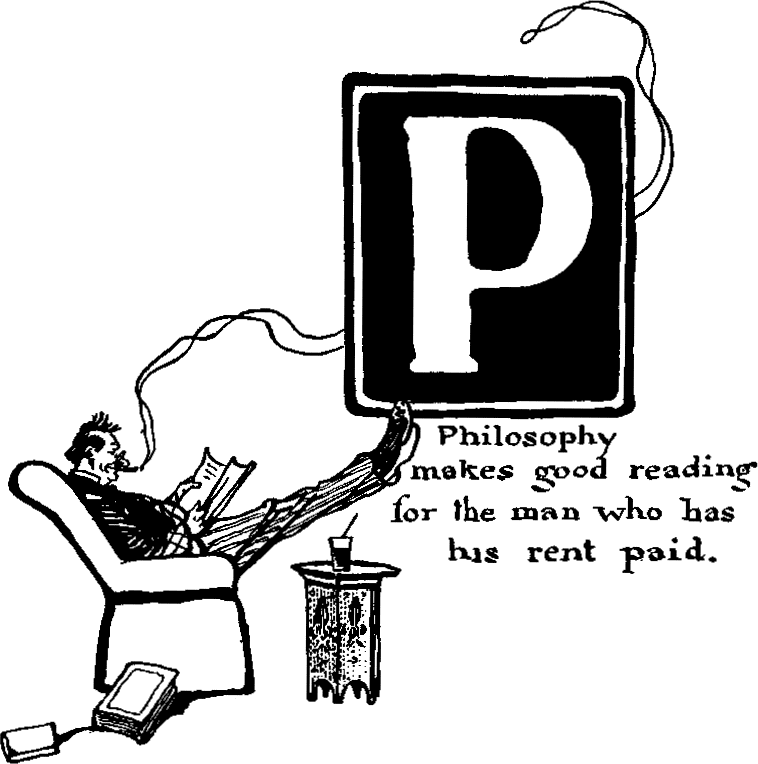
Perseverance is the root of all money.
Perhaps you have met the man who is so wrapped up in himself that he thinks he is a warm baby.
Pleasure travels with a brass band, but Trouble sneaks in on rubber shoes.
Philosophers do not believe half the things they tell themselves.

The sixteenth letter of the alphabet, used principally in pickled peppers.
PAINT. A polite name for balloon juice. See the bartender.
PALPITATION OF THE TONGUE. A disease that affects many women.
PATRIOT. A man who spends all his money for fireworks for the little boy and doesn't hold out $2 for the doctor's bill.
PATHOS. A poor man laughing at his rich wife's poor joke.
PEACH. A bit of domestic fruit, consisting of blonde tresses, a dimple, and three bows of pink ribbon.
PEEKABOO. A summer idea invented for the purpose of making a girl's shirtwaist something like a barb-wire fence with a full view of the scenery. It is constructed by making one stitch and forgetting seven. The Peekaboo is the only friend the mosquito has on earth.
PENITENTIARY. An assembly hall which always plays to a full house because whiskey is it's advance agent.
PHILOSOPHER. A man who can size himself up and forget the result.
PLAN. Something which any fool can lay, but it takes patience like a hen to hatch it.
PLEASURE. Fun you have to-day so you can worry over it to-morrow.
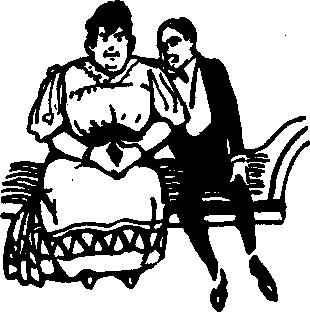
POETICAL LICENSE. A woman who weighs 275 pounds and listens to the name of Birdie.
POLITICS. The place where a man gets it—sometimes in the neck, sometimes in the bank.
POLITICIAN. The reason we have so much politics.
POPULARITY. The cold storage house where the world sends her favorites before she forgets them.
POSTERITY. A lot of people who will forget all about you before they are born.
PRACTICAL JOKE. When Nature makes a pink lobster look like a man.
PREDICTION. A bit of funny business invented by the Weather Man for the purpose of playing tiddledewinks with the weather. He says what he thinks it will be and then the weather is what it pleases.
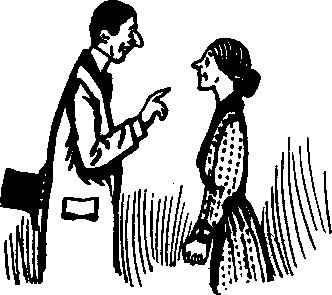
PROMISE. What a man says to a woman or a child to keep them quiet.
PRUDE. A female lady who wishes someone will say something so she can blush to listen and listen to blush.
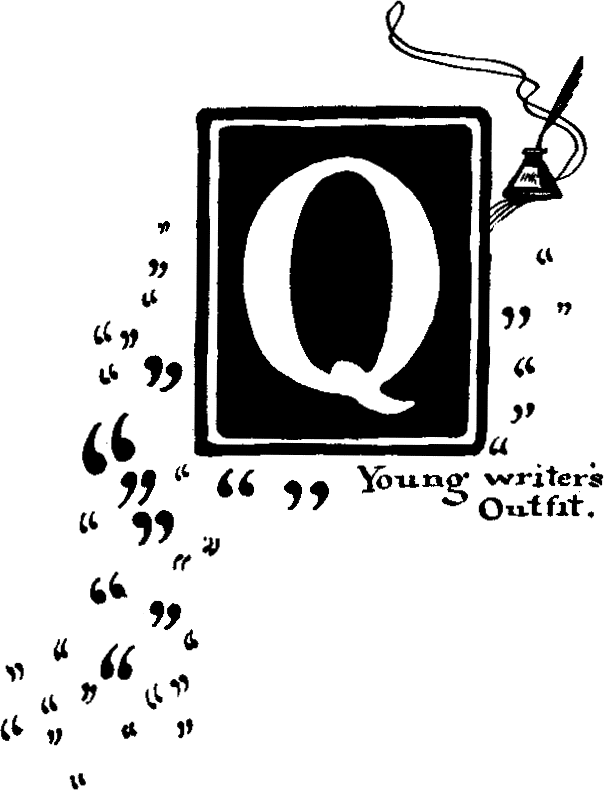
Quitters cannot be trained to quit quitting.
Queer, isn't it, that the lazier a man gets the more he wants to work somebody else.
Quotation marks cover a multitude of plagiarists.
Qualmless consciences are fashionable nowadays.
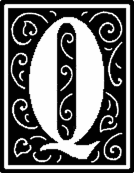
The seventeenth and the most hunted letter in the alphabet, because it is always followed by u.
QUACK. A doctor who ducks the law.
QUARREL. Something that shouldn't be picked before it's ripe.
QUART. The amount of wine a sport always wants to open.
QUIRE. A bunch of singers in a church. Sometimes called Choir, sometimes called down. See Scrap, fight, jealousy.

QUIVER. To shake for the drinks.
QUITTER. A man who stops before he gets started.
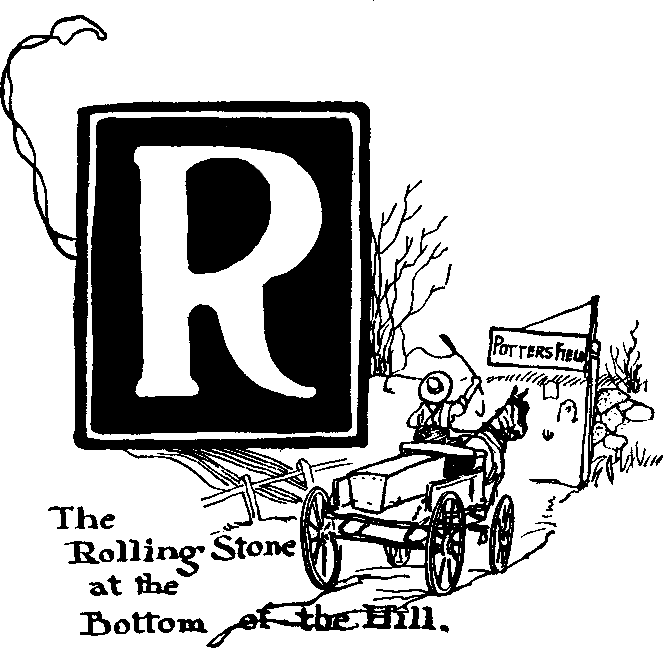
Remember—you can fool some of the people all the time if you care to spend your money that way.
Reasons may be found for everything except why does a woman get off a street car backwards.
Race suicide doesn't appeal to poor people.
Rolling stones gather no moss but look at the excitement they have.

The eighteenth letter of the alphabet, used principally to began a college yell; thus, Rah! Rah! Rah!
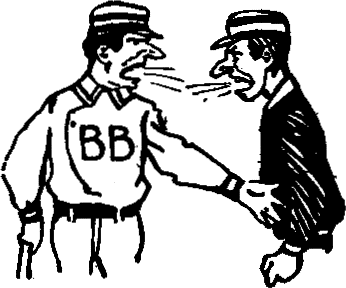
RAG. A material invented for chewing purposes.
RAKE. A man-about-town after he gets shop worn.
RARE. The way you get roast beef when you order it well done.
REFORM. A bird which is always flying towards us but which never gets here.
RETRIBUTION. A man who marries for money and finds it is all in Confederate bills.
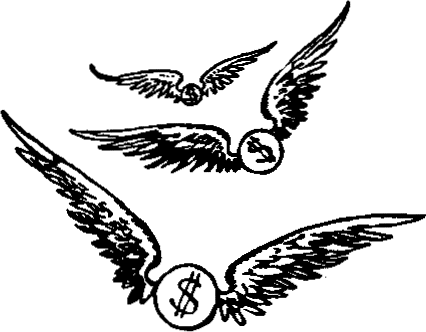
RICHES. Something which is said to have wings, but I can't prove it, because they never flew my way.
ROYSTERER. A man who sowed so much wild oats in his youth that he has to eat cracked oats in his age.
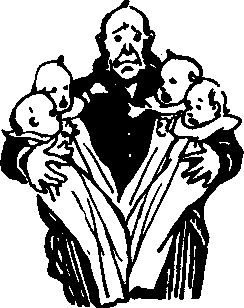
RACE-SUICIDE. A disease which was cured by T. Roosevelt, Esquire, when he invented an idea for the purpose of giving nursemaids steady employment. For instance:
Rondeau.
There was a nice old lady and
She lived within her shoe;
She had so many children that
She didn't know what to do.
She wrote the President and said
"I have twenty kids or more!"
The President replied to her
"Encore, old girl, encore!"
She answered, "I've no room at home
For more, so I am through!"
And he replied, "Why don't you go
And get another shoe?"
—Sir Walter Scott, page 96.
RIDDLE. A question-mark gone mad. A foolish member of the Interrogation family whose most fiendish offspring is "How old is Ann?" Some examples:
Ann's father sends his pitcher to the well; Mary's father sends his pitcher to the saloon; how much money has Ann's father saved?
Ann's mother has just finished reading a very beautiful story. Mary's mother sent over and borrowed the book. How old will Ann's mother be when the book gets back?
Ann's little brother is entertaining Ann's sweetheart in the parlor. Ann's little brother has just told Ann's sweetheart how old Ann is. How long did Ann's sweetheart remain after he learned the bitter truth?
Ann has a brother by the name of James. James wrote two letters, one to his wife and one to his lady typewriter. Ten minutes after mailing them he discovered that the right letter was in the wrong envelope. Which train did James take and when does Ann expect him back?
Ann took a dollar bill and went to a department store. She saved twenty cents for car fare and spent eighty cents for lunch. What were the clerks swearing at after Ann went out?
Ann had dark hair but she put peroxide on it to frighten it lighter. Ann's hair became angry at the peroxide and got up and left her head. Why does Ann converse with callers through the speaking tube?
Ann's friend Mary has seven brothers. One of them paints sawdust in a delicatessen factory at twelve dollars per. The other six play the races. What time does the dinner bell ring and who squares it with the grocer?
Ann has another friend by the name of Ellen. Ellen's father has one sitting room and four daughters. The four daughters are engaged to four nice young gentlemen. At what time in the evening does papa and mamma crawl out of the dumb waiter and how much is the gas bill?
Ann rode home in the Elevated Rough House at the twilight hour. Eighty-seven gentlemen were there hiding behind eighty-seven newspapers. Ann joined a strap and swung to and fro. How old was Ann when she received a seat?
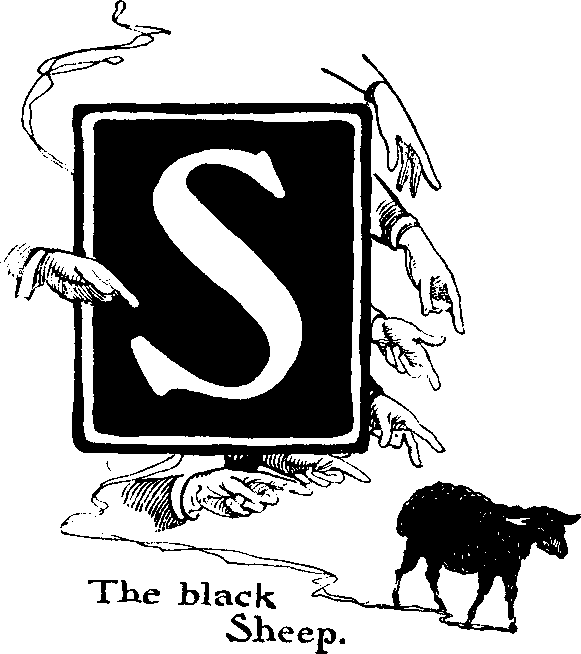
Some people's talk is too cheap at any price.
Some men are just like a mule, because they kick at the wrong time.
Some people save up their money for a rainy day and finally decide that a foggy day is a good enough excuse to spend it.
Scandal is the black sheep in the family of Love.
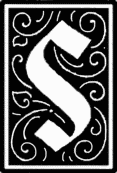

The nineteenth letter of the alphabet, which is called a sibilant, because it makes a hissing sound like a goose.
SALOON. Something which can be opened on credit, but it takes cash to start a church.
SARCASM. A thirty-dollar Panama hat on a thirty-cent man.
SATAN. An accommodating chap who picks out cosey-corners in his hot-house for the men that brag about being such devils among the women.
SCEPTIC. A man who will stop to see if there is a microbe in a kiss.
SEASHORE. A violent disease which breaks out all over people when the weather gets warm. The cure costs anywhere from $2 to $15 per day, according to the mood the landlord is in.
SINCERITY. What our friends think about us when our backs are turned.
SPECULATION. Paying a nickle for a seat in a street-car and then waiting till you get it.
STUBBORNNESS. A man who knows he is wrong but believes he is right for personal reasons.
SUCKERS. The bait used by those who go fishing for compliments.
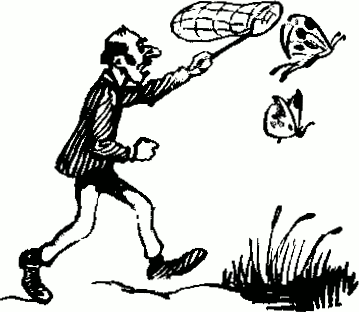
SUCCESS. Failure kicked to pieces by hard work. A man who can make enough noise when he wins out to drown the voices of the knockers. Something which can be caught if a man only runs long enough.
SWIFTNESS. The manner in which a fool and his rich wife's money are parted.
SYNONYM. A lazy man trying to win success and a hen trying to lay a corner-stone.
SEAT. A mythical place in a street car where many are called but few are chosen. For instance:
Little Jack Horner
Sat in a corner
Riding down town on the "L."
He jumped to his feet
Gave a lady his seat—
I'm a liar, but don't it sound well.
—Oliver Goldsmith, page 34.
SARDINE-CAR. A term of endearment given to crowded street cars.
Marcus Aurelius thus describes the sardine-car in his "Meditations"—see page 946—as follows:
The sardine-cars consist of fifty people trying to squeeze into a space that was built only for a Pajama hat and two newspapers.
The seats in the sardine-cars run sideways; the passengers [pg 101] run edgeways, and the life insurance agents run any old way when they see these cars coming.
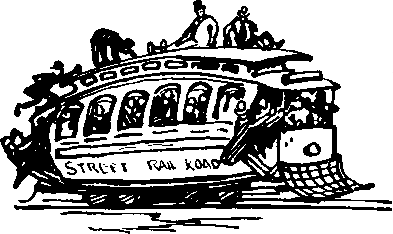
The sardine-car is the best genteel imitation of a rough-house that has ever been invented.
The are called "Sardine Cars" because the conductor has to let the passengers out with a can-opener.
Brave and strong men climb into a street car and they are full of health and life and vigor, but a few blocks up the road they fall out backwards and inquire feebly for a sanitarium.
To ride on the street cars in a big city of an evening brings out all that is in a man, including a lot of loud words he didn't know he had.
The last census shows us that the street cars in the city of New York have more ways of producing nervous prostration and palpitation of the brain to the square inch than the combined population of Amsterdam, Rotterdam, Tinkersdam and Gotterdammerung.
To get in some of the street cars about six o'clock is a problem, and to get out again is an assassination.
One evening I rode from Forty-second Street to Fifty-ninth without once touching the floor with my feet.
Part of the time I used the outposts of a stout gentleman to come between me and the ground, and during the rest of the occasion I hung on to a strap and swung out wild and free, like the Japanese flag on a windy day.
Some of our street cars lead a double life, because they are used all winter to act the part of a refrigerator.
It is a cold day when we cannot find it colder in the street cars.
In Germany we find Germans in the cars, but in America we find germs.
That is because this country is young and impulsive.
The germs in the street cars are extremely sociable and will often follow a stranger all the way home.
Often while riding in the street cars I have felt a germ rubbing against my ankle like a kitten, but being a gentleman, [pg 102] I did not reach down and kick it away because the law says we must not be disrespectful to the dumb brutes of the field.
Many of our street cars are made out of the same idea as a can of condensed milk.
The only difference is that the street cars have a sour taste like a lemon squeezer.
When you get out you cannot get in and when you get in you cannot get out because you hate to disturb the strange gentleman that is using your knee to lean over.
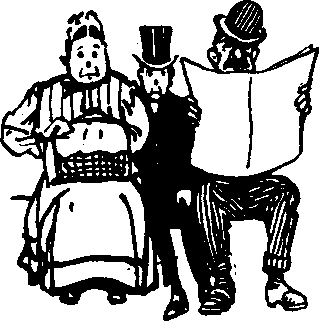
Between the seats there is a space of two feet, but in that space you will always find four feet and their owners, unless one of them happens to have a wooden leg. Under ordinary circumstances four into two won't go, but the sardine-cars defy the laws of gravitation.
A sardine-car conductor can put twenty-six into nine and still have four to carry.
The idea of expansion which is now used by our Congress was suggested by one of these sardine-cars.
The ladies of America have started a rebellion against the sardine-cars, but every time they start it the conductor pulls the bell and leaves the rebellious standing on the corner.
We are a very nervous and careless people in America. To prove how careless we are I will cite the fact that Manhattan Island is called after a cocktail.
This nervousness is our undoing because we are always in such a hurry to get somewhere that we would rather take the first car and get squeezed into breathlessness than wait for the next which would likely squeeze us into insensibility.
Breathlessness can be cured, but insensibility is dangerous without an alarm clock.
For a man with a small dining-room the sardine-car has its advantages, but when a stout man rides in them he finds himself supporting a lot of strangers he never met before.
One morning I jumped on one of those sardine-cars feeling just like a two-year-old, full of health and happiness.
During the first seven blocks three men fresh from a distillery grew up in front of me and removed the scenery.
One of them had to get out in a hurry so he kicked me on the shins to show how sorry he was to leave me.
One of the other two must have been in the distillery a long time because pretty soon he neglected to use his memory and sat down in my lap.
When I remonstrated with him he replied that this is a free country and if he wished to sit down I had no business to stop him.
Then his friend pulled us apart and I resumed the use of my lap.
During the next twenty blocks I had one of the worst daylight nightmares I ever rode behind.
The party which had been studying the exhibits in the distillery got the idea in his head that my foot was the loud pedal on a piano and he started to play the overture from William Tell until I yelled "W'at'ell!"
That man was such a hard drinker that he gave me the gout just from standing on my feet.
Then I jumped off and swore off and swore at and walked home.
If the man who invented the idea of standing up between the seats in a sardine-car is alive he should have a monument.
My idea would be to catch him alive and place the monument on him and have the conductor come around every ten minutes for his fare.
Then the punishment would have a fit like the crime.
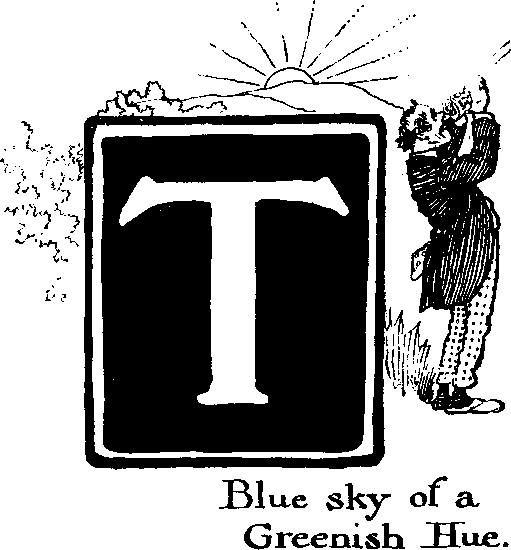
The man with plenty of money has friends to burn and when he goes broke he finds he has burned most of them.
The sky always looks blue when we look at it through a roll of bills.
The mud slinger never has clean hands.
The way of the transgressor is hard on his family.
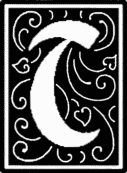
The twentieth letter of the alphabet, so called because the author of the alphabet always drank coffee.
TABLE. A wooden arrangement covered with green cloth around which certain parties gather for the purpose of taking each other's money. See gambling. You might, incidentally, see the police if they don't see you first.
TACT. The art of knowing just when to laugh at a rich man's joke.
TALENT. The ability to know how to keep still at the right moment.
TEMPER. Something you should keep, otherwise the man you show it to may hand it back to you with a short-arm jab.
TEMPTATION. The banana peel in a man's brain that causes him to slip.
THE LAUGH. Something which should always be on the other fellow.
TO-MORROW. The only day in the year that appeals to a lazy man.
THERMOMETER. A machine invented by a drugstore proprietor for the purpose of driving humanity to drink.
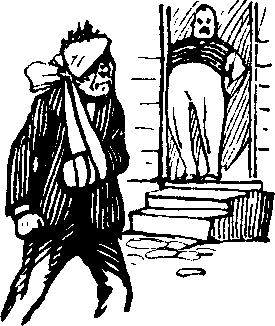
TROUBLE. The only thing which a man borrows and wants to pay back in a hurry. The place where a man finds his head when he loses it.
TROUBLE HUNTER. A man who always comes home with a game-bag full.
TRUTH. The kind words our enemies say about us. Something which never figures in politics because it forgets to register.

Undoubtedly the man that burns the candle at both ends is light-headed.
Usually you'll find that self-made men spend the rest of their lives talking about home industry.
Uneasy looks the face that wears a frown.
Unfortunately, many a Prince of Good Fellows loses his title when his pocketbook runs dry.
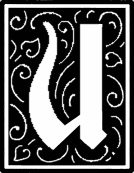
The twenty-first letter of the alphabet, about which there is some scandal because it is always tagging after Q.

UMPIRE. A guessing machine used and abused in and about a baseball game.
UNHAPPY. The man who knows it all with nobody to tell it to.
UNSELFISHNESS. To be able to read of a neighbor's success without reaching for the harpoon. A man who will give his last cigar to a stranger and then go home and kick his wife on the shins because she spent forty cents for baby's new shoes.
UNDERTAKER. A man who gets the laugh on those who take life as a joke.
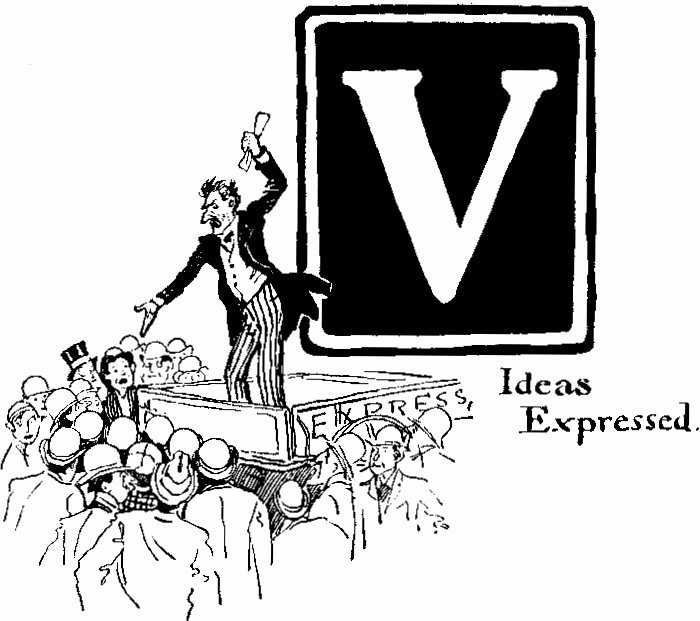
Vanity is the raw material from which hot air is manufactured.
Victors get the spoils, but the spoils generally spoil the victors.
Very true is it that the man without ideas always expresses them.
Valuable time is often wasted by men of little value.

The twenty-second letter of the alphabet, used as a pet name for a five-dollar bill.
VACATION. The time of the year which a young man looks forward to with his hand on his heart; goes through with his hand on his pocketbook, and looks back on with both hands on his head and no skin on his nose.
VACANT. The top story of a snob.
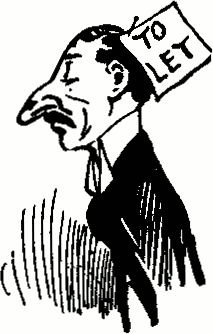
VANITY. The name of the machinery that makes our swelled heads.
VERSATILITY. The ability of a woman to wear a tight shoe and a loose smile at the same time.
VICE VERSA. To sleep with one's head at the foot of the bed and one's feet at the head of the bed. See Jag and Soused.
VIRTUE. Its own reward, but many people don't care to handle such a small amount.
VULGARIANS. People who go through the world like a lot of automobiles, with rubberneck tires and gasoline in their garrets, and noise, noise, noise.
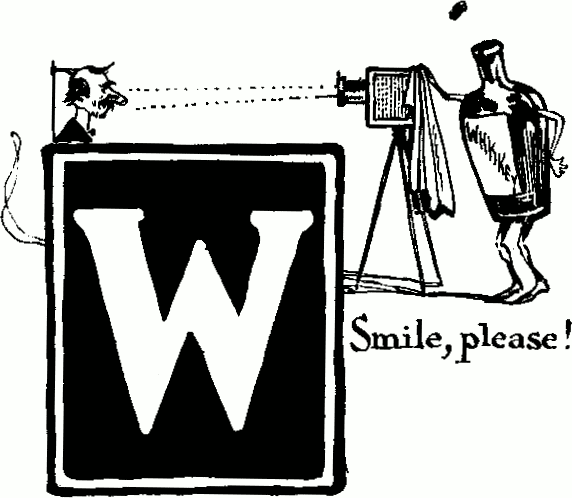
When a man is his own worst enemy the fight is always to a finish.
Whiskey is the name of the photographer that can make a high-priced man look like 30 cents.
When a man sits around waiting for something to turn up Fortune always turns him down.
When a man is anxious to keep your secret keep him anxious.

The twenty-third letter of the alphabet, which wasn't treated very well in the matter of a name.
WAD. A roll of bills with a rubber band around it. This is a wonderful weapon in the hands of a steady spender.
WAR. An excuse for talking about the dove of peace.
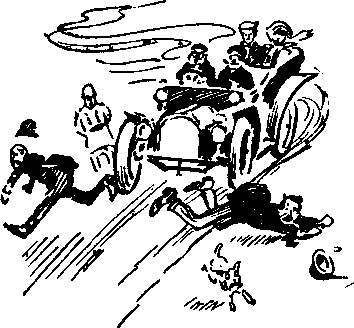
WEALTH. To have money enough to support an automobile that goes the pace that kills.
WEATHER MAN. A machine disguised as a human being who tries to play tiddlewinks with the weather. He tells the weather what to do, and the weather does as it pleases. A machine which says, "Cooler to-morrow, with westerly winds," but means something different. The idea comes from the Latin words "Guessa Gain," which mean, "I am paid to tell the truth, but I don't need the money."
WHISKEY. Old Mother Misery's dare-devil son.
WORRY. A lot of unwelcome thoughts which refuse to remain unthinkable.
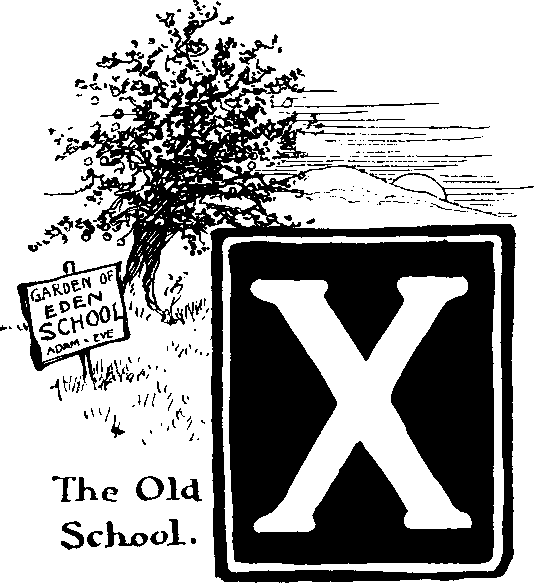
Xperience is the name of the concern which opened the first night school.
Xplanations quite often are old-fashioned lies disguised in good fashion.
Xpostulation often leads to the ambulance.
Xperience teaches some people to go and do the same fool thing over again.

The twenty-fourth letter of the alphabet. It was so late getting in that very few words are fastened to it.
X. That ten dollars you loaned some time ago.
XTRACTOR. The fellow you loaned it to.
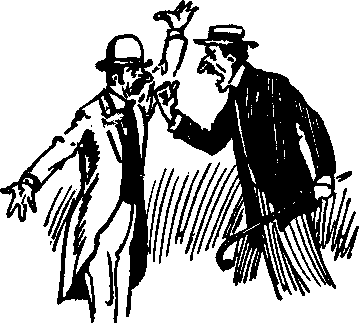
XCITEMENT. What happened when you tried to get it back.
X-RAYS. A machine you'll have to use to find your X.
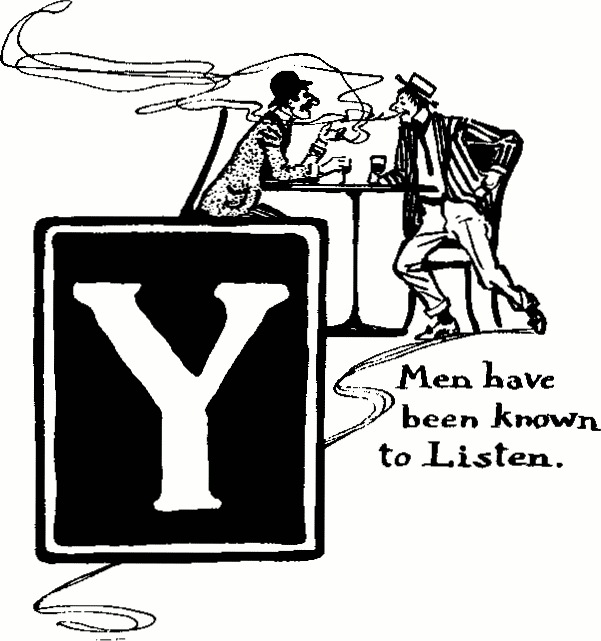
You shouldn't look a gift automobile in the price tag.
Yea, verily, a first-class listener is a woman's best friend.
Yes, and if it were not for the fools in this world the poor would never get rich.
You may take my word for it, that whatever a man hopes to be he will be, unless he gets on the wrong car.

The twenty-fifth letter of the alphabet, which is of a bibulous nature because it's always in rye. (Mercy!)
YAP. The real thing on the farm, but an awful thing on Broadway.
YACHT. A device which eats up money and yells for more.
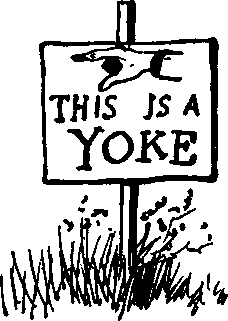
YOKE. The way a Swede says joke.
YESTERDAY. The day upon which our ship should have arrived.
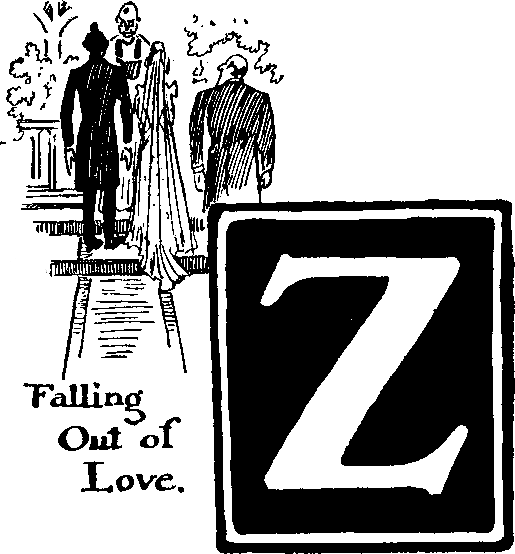
Zum men fall in love and get out of it by marrying the girl.
Zum men tell themselves a lie just to fool their conscience.
Zumhow or other a ticklish situation never gets a laugh from the parties concerned.
Zum say that money isn't everything in this world, but it takes a man with money to believe it.
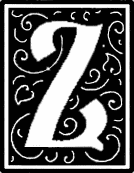
The twenty-sixth and last letter of the alphabet, and I'm glad of it.
ZEAL. The ardor with which we manage other people's affairs.
ZEBRA. An animal used principally to illustrate the letter Z.
ZERO. The place where the cold waves come from.
ZIP. The same as Zow.
ZOW. The same as Zip.
ZOO. A garden scented by wild animals.
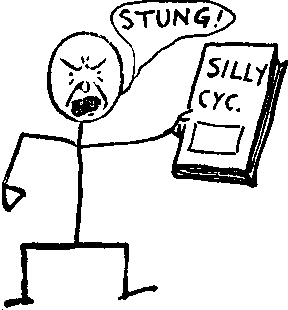
ZABO. A contraction of Gonzabo, which means a Fiff.
The automobile is the rich man's liquor and the poor man's chaser.
It keeps our streets full of red, white and blue streaks all the livelong day, and if the weary pedestrian is not supplied with a ball-bearing neck his chance of getting home is null and void.
Probably the safest part about the machinery of an automobile is the Chauffeur, because he knows which way to jump out.
Chauffeur is the name of the man who points the machine at you and dares you to get out of the way.
We have no word in the English language brave enough to ride on a horseless wagon when it goes real fast.
That is why we had to reach over to Paris and pull a word out of the French.
Chauffeur was the first word we grabbed, and I think we should give it back at the first opportunity.
The first Careless Cart we had in this country was called the "Coroner's Delight," because it lived up to its name.
Consequently it became necessary that a set of road rules should be composed which would help [pg 136] the general public to die easier when automobo-annihilated.
Here are the rules:
1.—One sharp toot from the horn on a Happy Hansom means that business men, messenger boys and other persons in a hurry must postpone indefinitely their contemplated journey across the street. Crossing the street in front of a chauffeur who has given the above signal is very bad form, and is generally productive of spinal meningitis and doctor's bills.
2.—Two sharp toots from the horn on a Vaseline Brougham is a signal to the truck drivers ahead that they must dismount at once, bow politely, and say "Gesundheit!" to the chauffeur as he passes. Truck drivers who refuse to obey this signal should be run into and injured severely.
3.—Three sharp toots from the horn on a Benzine Buggy is a signal to the policeman on the corner, who must immediately come to parade rest, doff his helmet and comment enthusiastically on the grace and general elegance of the chauffeur until the latter has disappeared in the distance. Policemen who fail to follow this rule should be arrested, tried, convicted and sent to Siberia.
4.—Four sharp toots from the horn on a Gasolene Barouche is a signal for the Fire Department to assemble immediately and remove all trees, statues and things of that sort, so that the chauffeur may take a short cut through any of the parks. Failure on the part of the firemen to obey this rule will justify the chauffeur in delaying an engine on its way to a fire by stopping in front of it long enough to get run over.
5.—Five sharp toots from the horn of a Whiz Wagon is a signal to all drivers of brewery wagons, ice wagons and mowing machines in the vicinage that they must descend at once from their various pedestals and lead their juggernautian caravans into the dry goods stores out of harm's way. If there are no dry good stores handy, a candy shop will do. No driver of a brewery wagon, ice wagon or mowing machine will be excused for breaking this rule simply because he doesn't know the meaning of vicinage.
6.—Six sharp toots from the horn of a Gas Carryall is a signal to conductors and motormen that they must, without any unnecessary delay, lift their cars from the rails and place them on the sidewalk. If the passengers in the cars so signalled offer any objections, the policemen on that beat will take the offenders to the nearest automobile garage and compel them to drink gasoline.
7.—One long and one short toot means that everybody in the neighborhood not in a Bubble must start promptly for the woods. Failure to observe this rule will justify any chauffeur in chasing the offender seventy-six consecutive miles in a southwesterly direction.
8.—Long and continued applause from the horn on any Rowdy Runabout means that the chauffeur has lost the combination on his brain cells, and is suffering severely from stage fright, superinduced by the sudden appearance of a coal cart directly in his pathway. In a predicament of this kind strict guiding rules cannot be laid down, but no blame can attach to the automobilist if he climbs over the tailboard of the vehicle and adds a new series of phrenological bumps to the suburban part of the head of the offending coal cart director.
9.—If the foregoing rules are carefully observed there is no occasion for further instructions, and automobubbling will become a thing of pleasure and a joy forever.
Life is a tragedy, and that's the best reason why it should be well acted.
What a lot of motive-power is wasted by those who jolly other people along.
A fault-finder is a home-made knocker.
Every woman jumps quickly from mice and at conclusions.
"Don't be a clam," must be wisdom on the half shell.
The man who means everything he says is generally a stingy talker.
Hot air is mighty, and will prevail in politics.
A fool and his money is the root of much laughter.
1.—Lie perfectly still and count 287,643 in a slow, methodical manner. By the time you have finished counting it will be daylight, and you will be surprised to notice how quickly the night has passed.
2.—Always partake of a bountiful repast before retiring, giving special attention to a lobster salad, welsh rarebit and hard-boiled eggs. This will, no doubt, give you delirium tremens, night-mare, St. Vitus' dance and indigestion, but the pleasing thought will remain that you have kept the rest of the household awake as well as yourself.
3.—Always undress in the dark. When you have broken three chairs, upset the centre table and stepped on six assorted tacks, you will realize what a stupid habit sleeping is anyway, and your senses will have become so acute that you will want to sit up and read the Family Story Paper during that portion of the night which has not been devoted to swearing.
4.—Always lie with your head lower than any other point of your body and throw the pillows away. The monotony of a sleepless night will then be relieved by the novelty of having apoplexy or heart failure, either of which diseases is much more exciting and dangerous than insomnia.
5.—Always concentrate your thoughts and endeavor to breathe pronouncedly and with exaggeration, like a freight engine climbing a grade. This is calculated to frighten the rest of the family into convulsions and stampede all the cattle in the neighborhood, but you will be enabled to while the remaining hours of the night away by listening to the terse remarks hurled at you from time to time by the other members of the household.
6.—Always sponge your face with boiling water several times before retiring. If you keep this up long enough it [pg 142] will be breakfast time, and you may then go about your daily labor with the happy consciousness that you have saved the bed clothes a great deal of wear and tear.
7.—Always take a brisk, long walk before retiring, taking particular care to come home late and allow the watch dog to mistake you for a tramp and chase you hurriedly into the next country side. It is also calculated to withdraw the blood from the brain and put wings on your feet. A brisk run of sixteen miles across country as the crow flies with an angry bulldog pushing you pretty hard for first place, is a pleasant diversion in a sleepless night.
8.—Be phlegmatic and indifferent in a marked degree. If you hear thieves in the chicken coop during the night, don't move a muscle; if you smell smoke and know the house is on fire, lie perfectly still and count imaginary sheep jumping over an imaginary fence; if you feel the folding bed closing up let it close and go on with your counting; if you know that burglars are in the room pay no attention to them and let them burgle—you have business of your own to attend to. A man with a thoroughly developed case of insomnia has no time for such trifling details.
All is not cold that shivers.
Success never shakes hands with a lazy man.
An American husband in the hand is worth two foreign Dukes in the divorce court.
The most successful politician is the one who knows how to finance his brains.
Before marriage a woman is an angel; after marriage she is still an angel, but her husband is now from Missouri, and she has to show him.
If it were impossible to speak anything but truth in this world how many times a day would we be insulted.
Whist is a well known game with cards. It requires close attention and silence. Some people learn to play whist in fifteen minutes, but their partners generally wear a worried look. There are other people who never learn to play the game, but, unfortunately for humanity, they never fully realize this fact. Their partners soon discover it, however, but politeness forbids them making the discovery known to the wide, wide world.
The following series of "Don'ts" may help you to understand some of the intricacies of the delightful game of whist. If they do not help you the only thing to do is to try pinochle:—
Don't get up and dance a serpentine dance every time you take a trick. It is in very bad taste, unless you are a good dancer, and even then your opponents may feel deeply chagrined.
Don't smile sweetly your partner and inform him in a few well-chosen words that you have seven trumps in your hand. Your opponents may hear you, and scowl darkly at you.
Don't fail to call the attention of your opponent to the fact that he or she hasn't followed suit, being very careful to select a loud and resonant tone of voice for the occasion. This compels your opponent to look carefully through his or her cards and fervently wish that you had sense enough to mind your own business.
Don't ask what's trumps more than eighteen times during one hand. The limit used to be twenty-six times, but the best authorities on whist now say eighteen.
Don't have a conniption fit every time you lose a trick. Conniption fits are very bad form, and they delay the game.
Don't get excited and climb up on the table when the game is close. It shows a want of refinement and breeding to climb up on the table, especially if you are in a strange house.
Don't whistle softly while waiting for somebody to play. Whistling is not in good taste. Go and perform on the piano. It has a much better effect, particularly if your selection is something lively, like "El Capitan" or "The Maiden's Prayer."
Don't talk politics while playing whist. Either whist or politics will suffer if you do. Statisticians claim that 34,647,932 times out of 34,647,933 it is whist that suffers.
Don't, when drawing a trick towards you, pause in the act to smile disdainfully upon your opponents. They may not admire a spectacular arrangement of your features, and if they happen to be in a bad humor your facial expression may be ruined for life.
Don't labor under the erroneous impression that your opponents have no right to trump your ace if they can. Neither is it considered elegant or refined to hit them carelessly across the forehead with the bric-à-brac for so doing.
Don't make an earnest endeavor to split the table asunder when playing a winning card. People may think you are eccentric if you try to make kindling wood of the table every time you lay down an honor.
Don't lead the three of clubs in mistake for the ace of trumps, and then get mad and jump seventeen feet in the air because you are not permitted to pull it back. It isn't good form to jump seventeen feet in the air. Besides, you might fall and hurt yourself and the neighborhood.
Don't hesitate to inquire what was led when there is but one card on the table. It shows that you are taking a deep interest in the game, and it makes the other players admire your elocutionary powers.
Don't fail to dispute the count after every hand has been played. It draws attention to the fact that you are anxious to win. It also draws uncomplimentary remarks from your opponents and sometimes occasions the use of a club.
Don't fall off the chair in horrified dismay when your opponent puts your ace to sleep with a little trump. Trumps were invented for that purpose, and horrified dismay is not becoming to every style of beauty.
How the rest of the world does hate the people who have a good time.
A Miss is as good as a mile of Misses—if you love the girl.
The horseshoe is always lucky—when the horse wins.
A hard worker will never be arrested for killing time.
One half the world doesn't know why the other half doesn't get off the earth.
Be good and you'll be happy, but you won't get your name in the papers so often.
These "do nots" have been arranged, compiled and hammered together with a view to rendering assistance to the spectator whose thinking machinery climbs out over his collar, and who shows symptoms of being dazed and disorderly during the progress of a game.
Don't have any regard for the feelings of your neighbors. Get up on the slightest provocation and yell. To make matters more exciting you had better get up on the back of the seat also.
Don't stop to make a careful selection of the English language before addressing the universe at large when the play is not to your liking. Say the first thing that comes into your mind. Doubtless, it will be glad to get out.
Don't pay any attention to the fact that ladies are in the immediate neighborhood. Your money is just as good as theirs. Besides, it's a man's privilege to swear and make a howling idiot of himself.
Don't fail to keep up a running comment on the general inefficiency of the visiting club. The majority of those who sit near you came out to the game especially to hear your views on this subject.
Don't neglect to call him a fat-headed renegade every time one of the home players makes an error. The home players need to be reproved at times, and nothing is quite so reproving as the term fat-headed renegade hurled at them by a bibulous gentleman with a subterbeerean voice.
Don't hesitate to tell all who are listening—and, if your voice is as convalescent as usual, everybody in your section of the Western Hemisphere will have to listen—that you know more about the game than Pop Anson and Pop Anson's younger brother, Methuselah. Under certain circumstances modesty is a crime; therefore, you should not commit a crime by withholding this information.
Don't forget the umpire. Don't forget him for one little moment. He will notice it if you do, and become miserably unhappy. Tell him what you think of him unceasingly. There is nothing so pleasing to an umpire's ears as the sweet strains of a whiskey-trimmed voice ringing softly on the evening air: "Hey, red-light, youse is a robber an' a thief!" Umpires love to be criticised in this manner. With every criticism they brace up wonderfully, and their straying sense of justice returns. You've noticed this fact, of course.
Don't hesitate to insult a player on the field. Remember, it is very hard for him to pick you out of the crowd. Besides, if he does, and jumps over the rail for the purpose of putting his imprint on your slats, you can scream for help. The police will probably wake up and come to your assistance.
Don't forget to use the most blood-curdling and decorative style of language now on the market when you engage in the pleasing duty of hurting a player's feelings. This will attract attention to you from all quarters, and will stamp you as a gentleman of the aber-nit style of architecture.
Don't pay any attention to the uneasiness displayed by those about you who came out for the selfish purpose of enjoying the game. If they cannot enjoy you and your lung-power exhibit, they should stay at home. Keep right on utilizing your vocal chords. Chatter on incessantly. Be a consistent ass until the last man is out and the umpire crawls into his cyclone cellar. Then go home and bathe what's left of your voice in witch hazel, and get ready for the morrow.
A trouble-hunter always makes a success of his job.
The girl who hesitates is left at the hitching post.
The world has a poor memory for many who believe themselves famous.
The wise man saves up for a rainy day, and always stays in the house when it storms.
It keeps many a good man down to keep up appearances.
Some men are like a phonograph—they talk when you start them, but they have no originality.
This Cook Book was invented by the President of the Food Trust with the hope that the poor man will find therein much to comfort him since meat and other luxuries have gone out of his life, because the Trust needs the money.
The beauty about the dishes mentioned here is their cheapness. Let us begin with the soup:
MOCK CHICKEN SOUP.—Take a piece of white paper and a lead pencil and draw from memory the outlines of a hen. Then carefully remove the feathers. Pour one gallon of boiling water into a saucepan and sprinkle a pinch of salt on the hen's tail. Now let it simper. If the soup has a blonde appearance stir it with a lead pencil which will make it more of a brunette. Let it boil two hours. Then coax the hen away from the saucepan and serve the soup hot, with a glass of ice-water on the side.
BEEF TEA.—Take the white of an egg and beat it without mercy. When it is insensible put it in the teapot and add enough boiling water to drown it. Let it drown about twenty minutes. Then lead the yolk of the egg over to the teapot and push it in. Season with a small pinch of tobasco and let it simper. Serve hot and always be sure to put a piece of lemon in the finger bowl.
MOCK BEEFSTEAK.—Carefully remove the laces from one shoe and put them away, because they can be used for shoe-string potatoes just as soon as the Potato Trust gets started. Beat the shoe with a hammer for ten minutes until its tongue stops wagging and it gets black and blue in the face. Then put it in the frying pan and stir gently. When it begins to sizzle add the yolk of an egg and season [pg 156] with parsley. Imitation parsley can be made from green wall paper with the scissors. If there is no green wall paper in the house speak to the landlord about it. Let it simper. In two hours try it with a fork. If it breaks the fork it is not done. Let it simper. Should you wish to smother it with onions, now is your chance, because after cooking so long it is almost helpless. Serve hot with a hatchet on the side. If there are more than four people in the family use both shoes.
IRISH STEW.—Remove the jacket and waistcoat from a potato and put it in a saucepan. Add three quarts of boiling water. Get a map of Ireland and hang it on the wall directly in front of the saucepan. This will furnish the local color for the stew. Let it boil two hours. When the potato begins to moult it is a sign the stew is getting done. Walk easy so as not to frighten it. Add a pinch of rhubarb and serve hot with lettuce dressing. This is one of the best stews without meat that the Food Trust has ever invented for the poor man.
MOCK PORK PIE.—Peel the bark carefully away from the hindquarters of a spruce tree and remove the tenderloin. One of last year's Christmas trees is excellent for the purpose. Chop it up fine and place in a saucepan. Add boiling water and let it simper two hours. Season with a pinch of salt, and if this is not satisfactory, you might also pinch a little pepper. Put the bark in the coffee grinder and turn the handle rapidly to the left. Add boiling water and serve with milk and sugar. This will be a splendid joke on the Coffee Trust. The mock pork pie is now done. Serve with lionaise dressing and tomato catsup. After dinner eat four pepsin tablets and send for the doctor.
IMITATION APPLE FRITTERS.—First catch your fritter. Be sure that it is a young fritter. The way to tell the age of a fritter is to count its teeth. Remove the shell and add a pitcher of apple sauce. Place this in a saucepan and tease it with a pinch of baking soda. Let it simper two hours. Serve hot and smile rapidly while eating. Laughter always aids digestion.
OX-TAIL CHOW CHOW.—To make ox-tail chow chow without an ox is one of the best jokes in the world on the appetite. Remove the pin-feathers from a young onion and chop it up fine, add water, stir gently and add more water. Let it sizzle. Add more water. Always boil the water before adding. Let it sizzle. Now remove the skum and serve hot with watercresses on the side. This is a nice dish for a small family and at the same time it shows what a generous nature the Food Trust has to suggest it.
MOCK GIBLETS.—Take two rubber-neck clams and after stuffing them with chestnuts fry them over a slow fire. The Coal Trust will see to it that you have no trouble in getting a slow but expensive fire. Let them sizzle. Now remove the necks from the clams and add baking soda. Let them sizzle. Take the juice of a lemon and scatter it at the clams. Serve hot, with pink finger bowls with your initials on them. Some people prefer to have their initials on the clams, but such an idea is only for the wealthy.
IMITATION PRUNE PIE.—Take a dozen knot-holes and peel them carefully. Remove the shells and add a cup of sugar. Stir quickly and put in a hot oven. Bake gently for six hours and then add a little Jamaica ginger. Serve cold with tea wafers and talk fast while eating them.
BREAKFAST BACON.—Take a hat full of pine shavings and remove the interior. Add a little sherry wine and sweeten to taste. Let them sizzle. Sprinkle with salt and pepper and other cosmetics and let them sizzle. Now turn them over with a spoon and serve them hot off the griddle.
SARATOGA CHIPS.—The same as the breakfast bacon only you don't remove the interior from the pine shavings. Just take them as Nature made them and add a little salad oil. Serve cold with shredded onions on the side.
MOCK BAKED BEANS.—Take as many buttons as the family can afford and remove the thread. Add pure spring water, put in a saucepan and stir gently until you burst your buttons. Add a little flour to calm them and let [pg 158] them sizzle. Serve with tomato catsup or molasses, according to the location you find yourself living on the map.
OATMEAL PUDDING.—Take the sawdust carefully from a freshly caught board and remove the husks. Add water and let it sizzle. Stir gently two hours, then rest a while. Pour the contents into a saucepan and saturate it with sugar and salt and other spices. Serve without splashing it, and add a little cold water painted white to look like milk. This last idea is a splendid joke on the Milk Trust.
HAMBURGER STEAK.—Always be sure to get a fresh Hamburger. There is nothing that will reconcile a man to a vegetarian diet so quickly as an over-ripe Hamburger. They should always be picked at the full of the moon. To tell the age of a Hamburger look at its teeth. One row of teeth for every year, and the limit is seven rows. Now remove the wishbone and slice carefully. Add Wooster sauce and let it sizzle. Add a pinch of potato salad and stir gently. Serve hot and eat fast with the eyes closed tight.
APPLE DUMPLINGS.—Take a large sheet of blotting paper and remove the ink. Ink is a non-conductor and discolors the palate. Borrow an apple from the grocer and tie it up in the blotting paper. The blotting paper will absorb the flavor from the apple in about three minutes. Now take the apple back to the grocer and say, "Much obliged, thank you!" Cut the blotting paper into thin slices and add water. Stir gently until it boils over then unhook it. Serve hot and if your husband kicks say to him bitterly: "You should have married an heiress with a Papa in the Food Trust then you could afford to have real apples!"
IMITATION ROAST TURKEY.—Find a copy of a Thanksgiving Day newspaper and select therefrom the fattest turkey on page 3. Now with a few kind words coax the turkey away from the newspaper in the direction of [pg 159] the kitchen. Care should be taken that the turkey does not escape in the butler's pantry or fly up the dumb waiter, because the turkey is a very nervous animal. Once you get the turkey in the kitchen lock the door and prepare the stuffing. The best stuffing for a turkey is chestnuts, which you can obtain by tearing a few pages from "The Life and Anecdotes of an After Dinner Speaker." Now remove the wishbone carelessly and make a wish. Then coax the turkey over to the gas stove and push it in. Let it sizzle for four hours and serve hot by a Russian waiter and with Japanese napkins.
MOCK CELERY.—Take an old whiskbroom and remove the handle. If the handle is made of wood keep it, because it can be turned into breakfast food the first time you see a sawmill. Now remove the wire from the whiskbroom and sprinkle with baking soda. Serve cold with a pinch of salt on the northwestern end.
MOCK CLAMS.—Take a rubber shoe and slice carefully. Add a dash of tobasco and stir gently. When the shoe occupies the same shape as a dozen rubber-neck clams serve with vanilla wafers and horseradish.
End of the Project Gutenberg EBook of The Silly Syclopedia, by Noah Lott
*** END OF THIS PROJECT GUTENBERG EBOOK THE SILLY SYCLOPEDIA ***
***** This file should be named 15705-h.htm or 15705-h.zip *****
This and all associated files of various formats will be found in:
http://www.gutenberg.net/1/5/7/0/15705/
Produced by Michelle Croyle, David Garcia and the Online Distributed
Proofreading Team
Updated editions will replace the previous one--the old editions
will be renamed.
Creating the works from public domain print editions means that no
one owns a United States copyright in these works, so the Foundation
(and you!) can copy and distribute it in the United States without
permission and without paying copyright royalties. Special rules,
set forth in the General Terms of Use part of this license, apply to
copying and distributing Project Gutenberg-tm electronic works to
protect the PROJECT GUTENBERG-tm concept and trademark. Project
Gutenberg is a registered trademark, and may not be used if you
charge for the eBooks, unless you receive specific permission. If you
do not charge anything for copies of this eBook, complying with the
rules is very easy. You may use this eBook for nearly any purpose
such as creation of derivative works, reports, performances and
research. They may be modified and printed and given away--you may do
practically ANYTHING with public domain eBooks. Redistribution is
subject to the trademark license, especially commercial
redistribution.
*** START: FULL LICENSE ***
THE FULL PROJECT GUTENBERG LICENSE
PLEASE READ THIS BEFORE YOU DISTRIBUTE OR USE THIS WORK
To protect the Project Gutenberg-tm mission of promoting the free
distribution of electronic works, by using or distributing this work
(or any other work associated in any way with the phrase "Project
Gutenberg"), you agree to comply with all the terms of the Full Project
Gutenberg-tm License (available with this file or online at
http://gutenberg.net/license).
Section 1. General Terms of Use and Redistributing Project Gutenberg-tm
electronic works
1.A. By reading or using any part of this Project Gutenberg-tm
electronic work, you indicate that you have read, understand, agree to
and accept all the terms of this license and intellectual property
(trademark/copyright) agreement. If you do not agree to abide by all
the terms of this agreement, you must cease using and return or destroy
all copies of Project Gutenberg-tm electronic works in your possession.
If you paid a fee for obtaining a copy of or access to a Project
Gutenberg-tm electronic work and you do not agree to be bound by the
terms of this agreement, you may obtain a refund from the person or
entity to whom you paid the fee as set forth in paragraph 1.E.8.
1.B. "Project Gutenberg" is a registered trademark. It may only be
used on or associated in any way with an electronic work by people who
agree to be bound by the terms of this agreement. There are a few
things that you can do with most Project Gutenberg-tm electronic works
even without complying with the full terms of this agreement. See
paragraph 1.C below. There are a lot of things you can do with Project
Gutenberg-tm electronic works if you follow the terms of this agreement
and help preserve free future access to Project Gutenberg-tm electronic
works. See paragraph 1.E below.
1.C. The Project Gutenberg Literary Archive Foundation ("the Foundation"
or PGLAF), owns a compilation copyright in the collection of Project
Gutenberg-tm electronic works. Nearly all the individual works in the
collection are in the public domain in the United States. If an
individual work is in the public domain in the United States and you are
located in the United States, we do not claim a right to prevent you from
copying, distributing, performing, displaying or creating derivative
works based on the work as long as all references to Project Gutenberg
are removed. Of course, we hope that you will support the Project
Gutenberg-tm mission of promoting free access to electronic works by
freely sharing Project Gutenberg-tm works in compliance with the terms of
this agreement for keeping the Project Gutenberg-tm name associated with
the work. You can easily comply with the terms of this agreement by
keeping this work in the same format with its attached full Project
Gutenberg-tm License when you share it without charge with others.
1.D. The copyright laws of the place where you are located also govern
what you can do with this work. Copyright laws in most countries are in
a constant state of change. If you are outside the United States, check
the laws of your country in addition to the terms of this agreement
before downloading, copying, displaying, performing, distributing or
creating derivative works based on this work or any other Project
Gutenberg-tm work. The Foundation makes no representations concerning
the copyright status of any work in any country outside the United
States.
1.E. Unless you have removed all references to Project Gutenberg:
1.E.1. The following sentence, with active links to, or other immediate
access to, the full Project Gutenberg-tm License must appear prominently
whenever any copy of a Project Gutenberg-tm work (any work on which the
phrase "Project Gutenberg" appears, or with which the phrase "Project
Gutenberg" is associated) is accessed, displayed, performed, viewed,
copied or distributed:
This eBook is for the use of anyone anywhere at no cost and with
almost no restrictions whatsoever. You may copy it, give it away or
re-use it under the terms of the Project Gutenberg License included
with this eBook or online at www.gutenberg.net
1.E.2. If an individual Project Gutenberg-tm electronic work is derived
from the public domain (does not contain a notice indicating that it is
posted with permission of the copyright holder), the work can be copied
and distributed to anyone in the United States without paying any fees
or charges. If you are redistributing or providing access to a work
with the phrase "Project Gutenberg" associated with or appearing on the
work, you must comply either with the requirements of paragraphs 1.E.1
through 1.E.7 or obtain permission for the use of the work and the
Project Gutenberg-tm trademark as set forth in paragraphs 1.E.8 or
1.E.9.
1.E.3. If an individual Project Gutenberg-tm electronic work is posted
with the permission of the copyright holder, your use and distribution
must comply with both paragraphs 1.E.1 through 1.E.7 and any additional
terms imposed by the copyright holder. Additional terms will be linked
to the Project Gutenberg-tm License for all works posted with the
permission of the copyright holder found at the beginning of this work.
1.E.4. Do not unlink or detach or remove the full Project Gutenberg-tm
License terms from this work, or any files containing a part of this
work or any other work associated with Project Gutenberg-tm.
1.E.5. Do not copy, display, perform, distribute or redistribute this
electronic work, or any part of this electronic work, without
prominently displaying the sentence set forth in paragraph 1.E.1 with
active links or immediate access to the full terms of the Project
Gutenberg-tm License.
1.E.6. You may convert to and distribute this work in any binary,
compressed, marked up, nonproprietary or proprietary form, including any
word processing or hypertext form. However, if you provide access to or
distribute copies of a Project Gutenberg-tm work in a format other than
"Plain Vanilla ASCII" or other format used in the official version
posted on the official Project Gutenberg-tm web site (www.gutenberg.net),
you must, at no additional cost, fee or expense to the user, provide a
copy, a means of exporting a copy, or a means of obtaining a copy upon
request, of the work in its original "Plain Vanilla ASCII" or other
form. Any alternate format must include the full Project Gutenberg-tm
License as specified in paragraph 1.E.1.
1.E.7. Do not charge a fee for access to, viewing, displaying,
performing, copying or distributing any Project Gutenberg-tm works
unless you comply with paragraph 1.E.8 or 1.E.9.
1.E.8. You may charge a reasonable fee for copies of or providing
access to or distributing Project Gutenberg-tm electronic works provided
that
- You pay a royalty fee of 20% of the gross profits you derive from
the use of Project Gutenberg-tm works calculated using the method
you already use to calculate your applicable taxes. The fee is
owed to the owner of the Project Gutenberg-tm trademark, but he
has agreed to donate royalties under this paragraph to the
Project Gutenberg Literary Archive Foundation. Royalty payments
must be paid within 60 days following each date on which you
prepare (or are legally required to prepare) your periodic tax
returns. Royalty payments should be clearly marked as such and
sent to the Project Gutenberg Literary Archive Foundation at the
address specified in Section 4, "Information about donations to
the Project Gutenberg Literary Archive Foundation."
- You provide a full refund of any money paid by a user who notifies
you in writing (or by e-mail) within 30 days of receipt that s/he
does not agree to the terms of the full Project Gutenberg-tm
License. You must require such a user to return or
destroy all copies of the works possessed in a physical medium
and discontinue all use of and all access to other copies of
Project Gutenberg-tm works.
- You provide, in accordance with paragraph 1.F.3, a full refund of any
money paid for a work or a replacement copy, if a defect in the
electronic work is discovered and reported to you within 90 days
of receipt of the work.
- You comply with all other terms of this agreement for free
distribution of Project Gutenberg-tm works.
1.E.9. If you wish to charge a fee or distribute a Project Gutenberg-tm
electronic work or group of works on different terms than are set
forth in this agreement, you must obtain permission in writing from
both the Project Gutenberg Literary Archive Foundation and Michael
Hart, the owner of the Project Gutenberg-tm trademark. Contact the
Foundation as set forth in Section 3 below.
1.F.
1.F.1. Project Gutenberg volunteers and employees expend considerable
effort to identify, do copyright research on, transcribe and proofread
public domain works in creating the Project Gutenberg-tm
collection. Despite these efforts, Project Gutenberg-tm electronic
works, and the medium on which they may be stored, may contain
"Defects," such as, but not limited to, incomplete, inaccurate or
corrupt data, transcription errors, a copyright or other intellectual
property infringement, a defective or damaged disk or other medium, a
computer virus, or computer codes that damage or cannot be read by
your equipment.
1.F.2. LIMITED WARRANTY, DISCLAIMER OF DAMAGES - Except for the "Right
of Replacement or Refund" described in paragraph 1.F.3, the Project
Gutenberg Literary Archive Foundation, the owner of the Project
Gutenberg-tm trademark, and any other party distributing a Project
Gutenberg-tm electronic work under this agreement, disclaim all
liability to you for damages, costs and expenses, including legal
fees. YOU AGREE THAT YOU HAVE NO REMEDIES FOR NEGLIGENCE, STRICT
LIABILITY, BREACH OF WARRANTY OR BREACH OF CONTRACT EXCEPT THOSE
PROVIDED IN PARAGRAPH F3. YOU AGREE THAT THE FOUNDATION, THE
TRADEMARK OWNER, AND ANY DISTRIBUTOR UNDER THIS AGREEMENT WILL NOT BE
LIABLE TO YOU FOR ACTUAL, DIRECT, INDIRECT, CONSEQUENTIAL, PUNITIVE OR
INCIDENTAL DAMAGES EVEN IF YOU GIVE NOTICE OF THE POSSIBILITY OF SUCH
DAMAGE.
1.F.3. LIMITED RIGHT OF REPLACEMENT OR REFUND - If you discover a
defect in this electronic work within 90 days of receiving it, you can
receive a refund of the money (if any) you paid for it by sending a
written explanation to the person you received the work from. If you
received the work on a physical medium, you must return the medium with
your written explanation. The person or entity that provided you with
the defective work may elect to provide a replacement copy in lieu of a
refund. If you received the work electronically, the person or entity
providing it to you may choose to give you a second opportunity to
receive the work electronically in lieu of a refund. If the second copy
is also defective, you may demand a refund in writing without further
opportunities to fix the problem.
1.F.4. Except for the limited right of replacement or refund set forth
in paragraph 1.F.3, this work is provided to you 'AS-IS' WITH NO OTHER
WARRANTIES OF ANY KIND, EXPRESS OR IMPLIED, INCLUDING BUT NOT LIMITED TO
WARRANTIES OF MERCHANTIBILITY OR FITNESS FOR ANY PURPOSE.
1.F.5. Some states do not allow disclaimers of certain implied
warranties or the exclusion or limitation of certain types of damages.
If any disclaimer or limitation set forth in this agreement violates the
law of the state applicable to this agreement, the agreement shall be
interpreted to make the maximum disclaimer or limitation permitted by
the applicable state law. The invalidity or unenforceability of any
provision of this agreement shall not void the remaining provisions.
1.F.6. INDEMNITY - You agree to indemnify and hold the Foundation, the
trademark owner, any agent or employee of the Foundation, anyone
providing copies of Project Gutenberg-tm electronic works in accordance
with this agreement, and any volunteers associated with the production,
promotion and distribution of Project Gutenberg-tm electronic works,
harmless from all liability, costs and expenses, including legal fees,
that arise directly or indirectly from any of the following which you do
or cause to occur: (a) distribution of this or any Project Gutenberg-tm
work, (b) alteration, modification, or additions or deletions to any
Project Gutenberg-tm work, and (c) any Defect you cause.
Section 2. Information about the Mission of Project Gutenberg-tm
Project Gutenberg-tm is synonymous with the free distribution of
electronic works in formats readable by the widest variety of computers
including obsolete, old, middle-aged and new computers. It exists
because of the efforts of hundreds of volunteers and donations from
people in all walks of life.
Volunteers and financial support to provide volunteers with the
assistance they need, is critical to reaching Project Gutenberg-tm's
goals and ensuring that the Project Gutenberg-tm collection will
remain freely available for generations to come. In 2001, the Project
Gutenberg Literary Archive Foundation was created to provide a secure
and permanent future for Project Gutenberg-tm and future generations.
To learn more about the Project Gutenberg Literary Archive Foundation
and how your efforts and donations can help, see Sections 3 and 4
and the Foundation web page at http://www.pglaf.org.
Section 3. Information about the Project Gutenberg Literary Archive
Foundation
The Project Gutenberg Literary Archive Foundation is a non profit
501(c)(3) educational corporation organized under the laws of the
state of Mississippi and granted tax exempt status by the Internal
Revenue Service. The Foundation's EIN or federal tax identification
number is 64-6221541. Its 501(c)(3) letter is posted at
http://pglaf.org/fundraising. Contributions to the Project Gutenberg
Literary Archive Foundation are tax deductible to the full extent
permitted by U.S. federal laws and your state's laws.
The Foundation's principal office is located at 4557 Melan Dr. S.
Fairbanks, AK, 99712., but its volunteers and employees are scattered
throughout numerous locations. Its business office is located at
809 North 1500 West, Salt Lake City, UT 84116, (801) 596-1887, email
business@pglaf.org. Email contact links and up to date contact
information can be found at the Foundation's web site and official
page at http://pglaf.org
For additional contact information:
Dr. Gregory B. Newby
Chief Executive and Director
gbnewby@pglaf.org
Section 4. Information about Donations to the Project Gutenberg
Literary Archive Foundation
Project Gutenberg-tm depends upon and cannot survive without wide
spread public support and donations to carry out its mission of
increasing the number of public domain and licensed works that can be
freely distributed in machine readable form accessible by the widest
array of equipment including outdated equipment. Many small donations
($1 to $5,000) are particularly important to maintaining tax exempt
status with the IRS.
The Foundation is committed to complying with the laws regulating
charities and charitable donations in all 50 states of the United
States. Compliance requirements are not uniform and it takes a
considerable effort, much paperwork and many fees to meet and keep up
with these requirements. We do not solicit donations in locations
where we have not received written confirmation of compliance. To
SEND DONATIONS or determine the status of compliance for any
particular state visit http://pglaf.org
While we cannot and do not solicit contributions from states where we
have not met the solicitation requirements, we know of no prohibition
against accepting unsolicited donations from donors in such states who
approach us with offers to donate.
International donations are gratefully accepted, but we cannot make
any statements concerning tax treatment of donations received from
outside the United States. U.S. laws alone swamp our small staff.
Please check the Project Gutenberg Web pages for current donation
methods and addresses. Donations are accepted in a number of other
ways including including checks, online payments and credit card
donations. To donate, please visit: http://pglaf.org/donate
Section 5. General Information About Project Gutenberg-tm electronic
works.
Professor Michael S. Hart is the originator of the Project Gutenberg-tm
concept of a library of electronic works that could be freely shared
with anyone. For thirty years, he produced and distributed Project
Gutenberg-tm eBooks with only a loose network of volunteer support.
Project Gutenberg-tm eBooks are often created from several printed
editions, all of which are confirmed as Public Domain in the U.S.
unless a copyright notice is included. Thus, we do not necessarily
keep eBooks in compliance with any particular paper edition.
Most people start at our Web site which has the main PG search facility:
http://www.gutenberg.net
This Web site includes information about Project Gutenberg-tm,
including how to make donations to the Project Gutenberg Literary
Archive Foundation, how to help produce our new eBooks, and how to
subscribe to our email newsletter to hear about new eBooks.